Ethics and Professionalism in Financial Advice
VerifiedAdded on 2022/10/01
|20
|5258
|371
AI Summary
This document discusses the importance of ethics and professionalism in financial advice. It covers various scenarios and the codes of ethics laid by FASEA that should be followed by financial advisors.
Contribute Materials
Your contribution can guide someone’s learning journey. Share your
documents today.
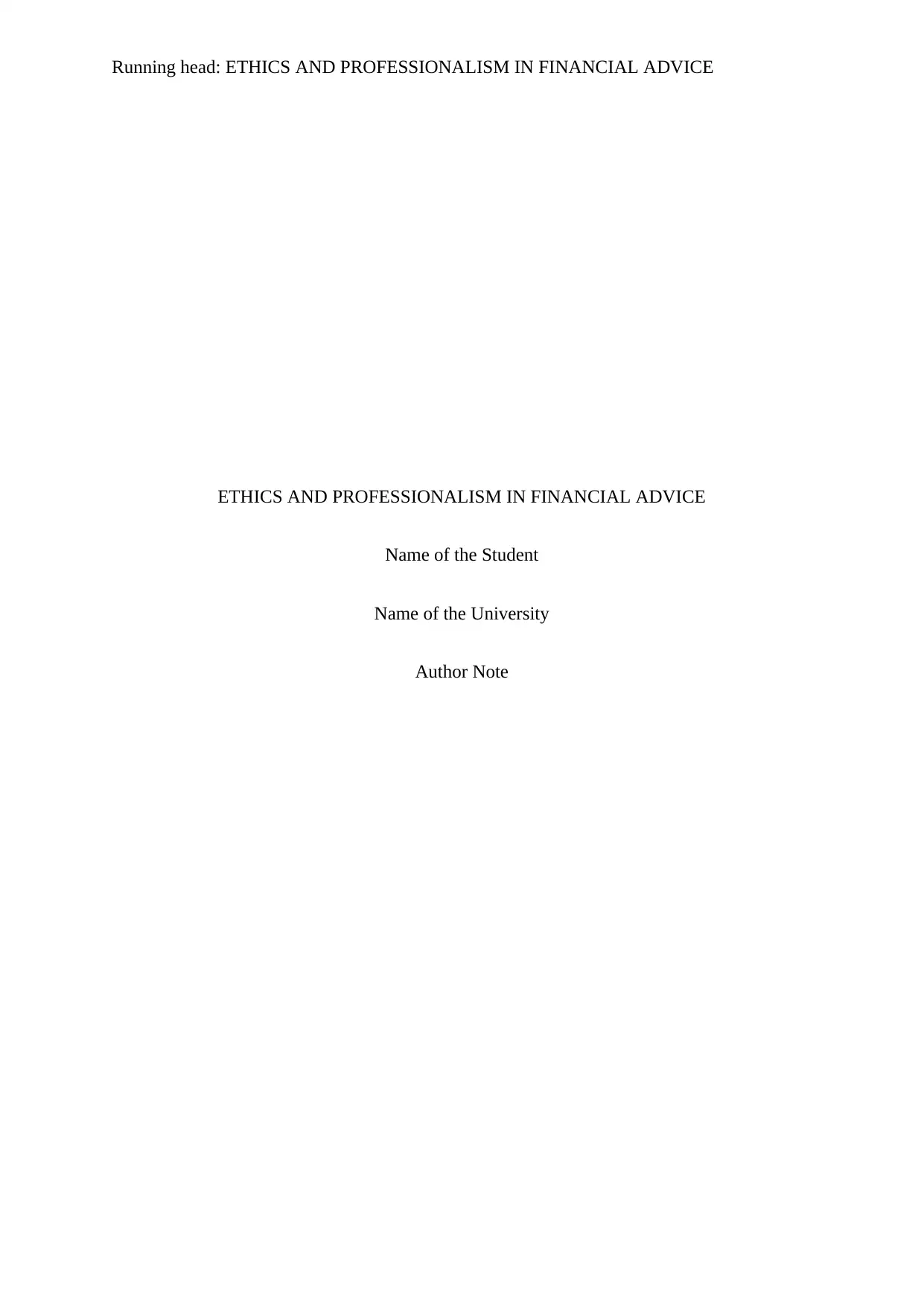
Running head: ETHICS AND PROFESSIONALISM IN FINANCIAL ADVICE
ETHICS AND PROFESSIONALISM IN FINANCIAL ADVICE
Name of the Student
Name of the University
Author Note
ETHICS AND PROFESSIONALISM IN FINANCIAL ADVICE
Name of the Student
Name of the University
Author Note
Secure Best Marks with AI Grader
Need help grading? Try our AI Grader for instant feedback on your assignments.
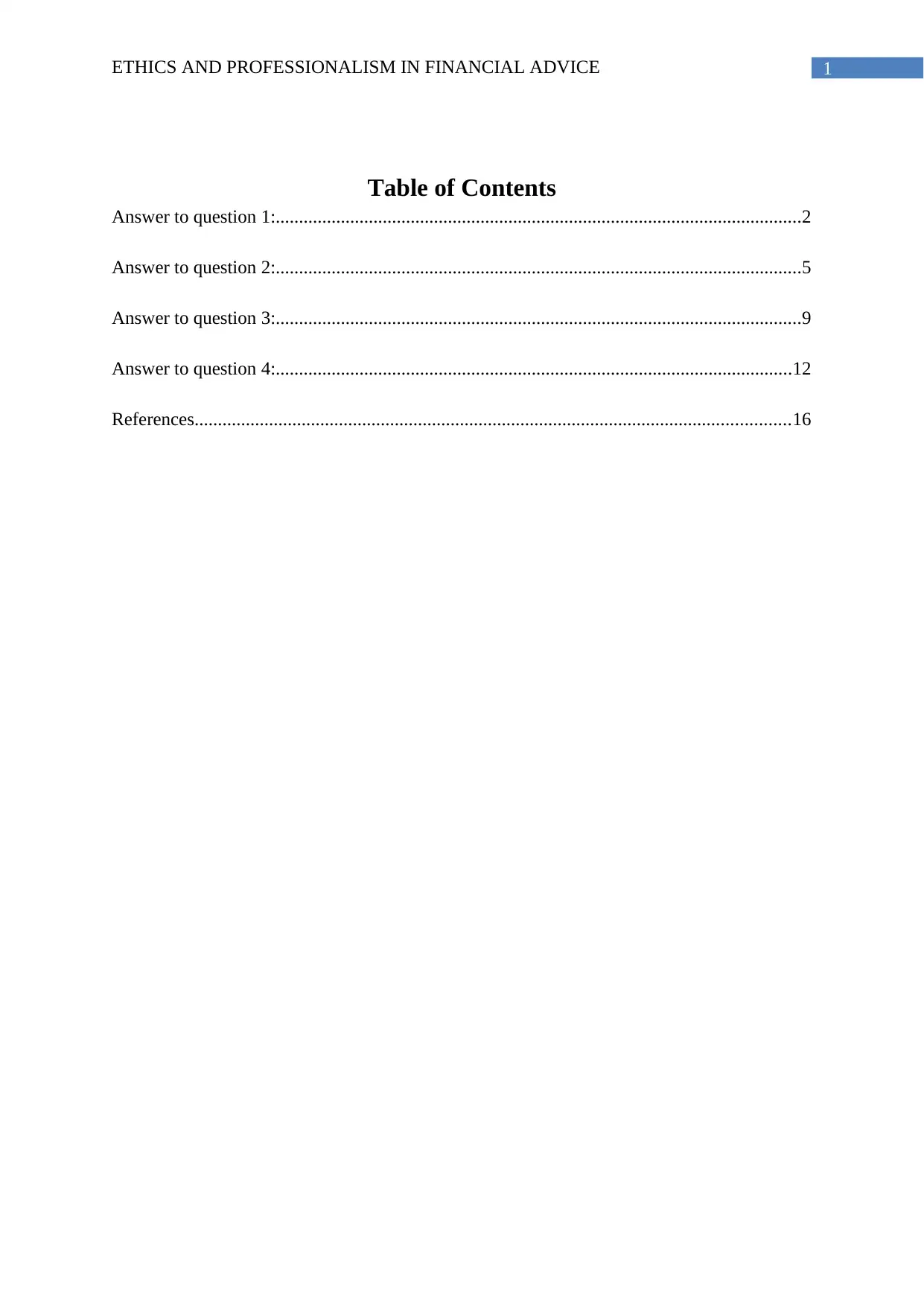
1ETHICS AND PROFESSIONALISM IN FINANCIAL ADVICE
Table of Contents
Answer to question 1:.................................................................................................................2
Answer to question 2:.................................................................................................................5
Answer to question 3:.................................................................................................................9
Answer to question 4:...............................................................................................................12
References................................................................................................................................16
Table of Contents
Answer to question 1:.................................................................................................................2
Answer to question 2:.................................................................................................................5
Answer to question 3:.................................................................................................................9
Answer to question 4:...............................................................................................................12
References................................................................................................................................16
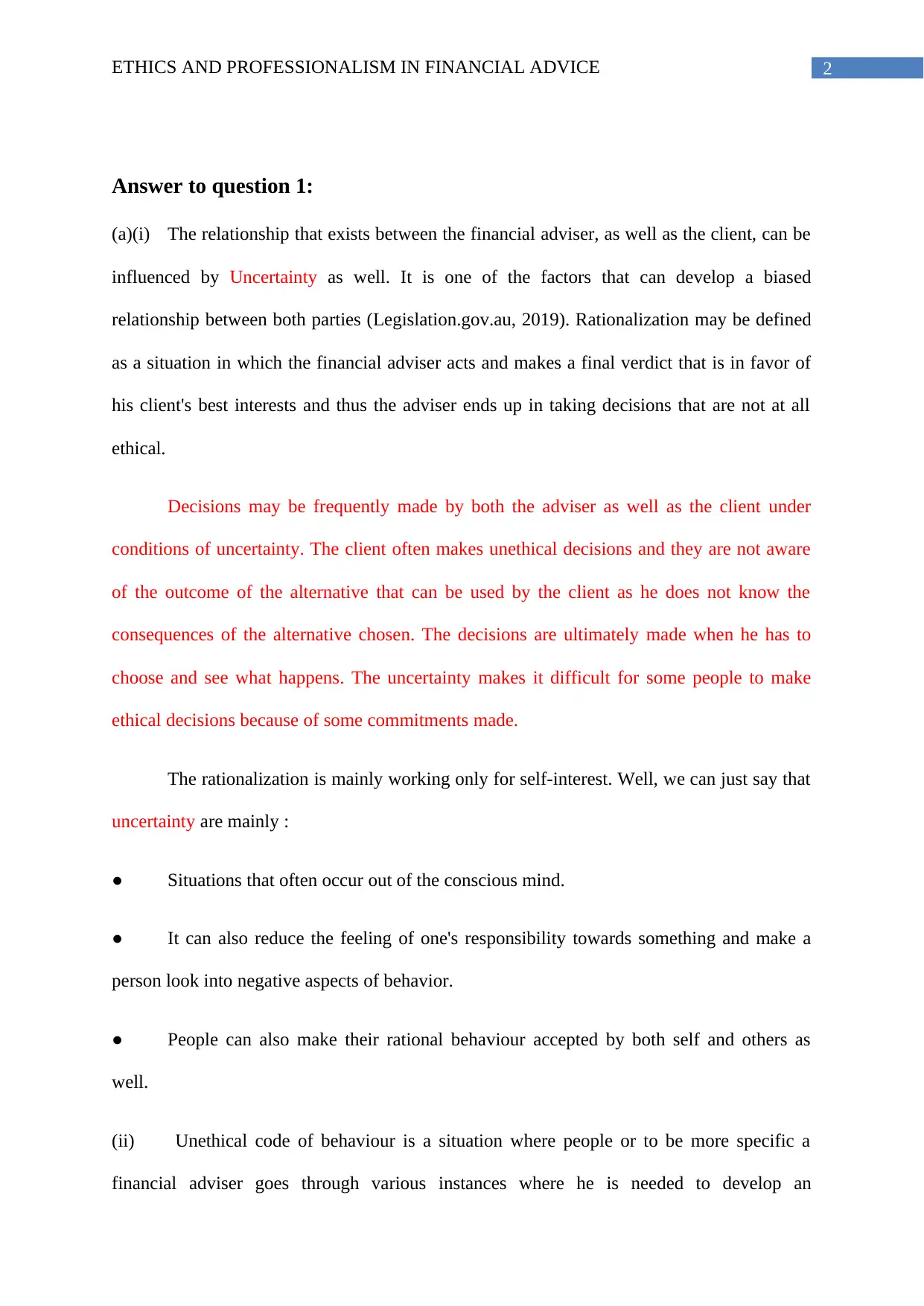
2ETHICS AND PROFESSIONALISM IN FINANCIAL ADVICE
Answer to question 1:
(a)(i) The relationship that exists between the financial adviser, as well as the client, can be
influenced by Uncertainty as well. It is one of the factors that can develop a biased
relationship between both parties (Legislation.gov.au, 2019). Rationalization may be defined
as a situation in which the financial adviser acts and makes a final verdict that is in favor of
his client's best interests and thus the adviser ends up in taking decisions that are not at all
ethical.
Decisions may be frequently made by both the adviser as well as the client under
conditions of uncertainty. The client often makes unethical decisions and they are not aware
of the outcome of the alternative that can be used by the client as he does not know the
consequences of the alternative chosen. The decisions are ultimately made when he has to
choose and see what happens. The uncertainty makes it difficult for some people to make
ethical decisions because of some commitments made.
The rationalization is mainly working only for self-interest. Well, we can just say that
uncertainty are mainly :
● Situations that often occur out of the conscious mind.
● It can also reduce the feeling of one's responsibility towards something and make a
person look into negative aspects of behavior.
● People can also make their rational behaviour accepted by both self and others as
well.
(ii) Unethical code of behaviour is a situation where people or to be more specific a
financial adviser goes through various instances where he is needed to develop an
Answer to question 1:
(a)(i) The relationship that exists between the financial adviser, as well as the client, can be
influenced by Uncertainty as well. It is one of the factors that can develop a biased
relationship between both parties (Legislation.gov.au, 2019). Rationalization may be defined
as a situation in which the financial adviser acts and makes a final verdict that is in favor of
his client's best interests and thus the adviser ends up in taking decisions that are not at all
ethical.
Decisions may be frequently made by both the adviser as well as the client under
conditions of uncertainty. The client often makes unethical decisions and they are not aware
of the outcome of the alternative that can be used by the client as he does not know the
consequences of the alternative chosen. The decisions are ultimately made when he has to
choose and see what happens. The uncertainty makes it difficult for some people to make
ethical decisions because of some commitments made.
The rationalization is mainly working only for self-interest. Well, we can just say that
uncertainty are mainly :
● Situations that often occur out of the conscious mind.
● It can also reduce the feeling of one's responsibility towards something and make a
person look into negative aspects of behavior.
● People can also make their rational behaviour accepted by both self and others as
well.
(ii) Unethical code of behaviour is a situation where people or to be more specific a
financial adviser goes through various instances where he is needed to develop an
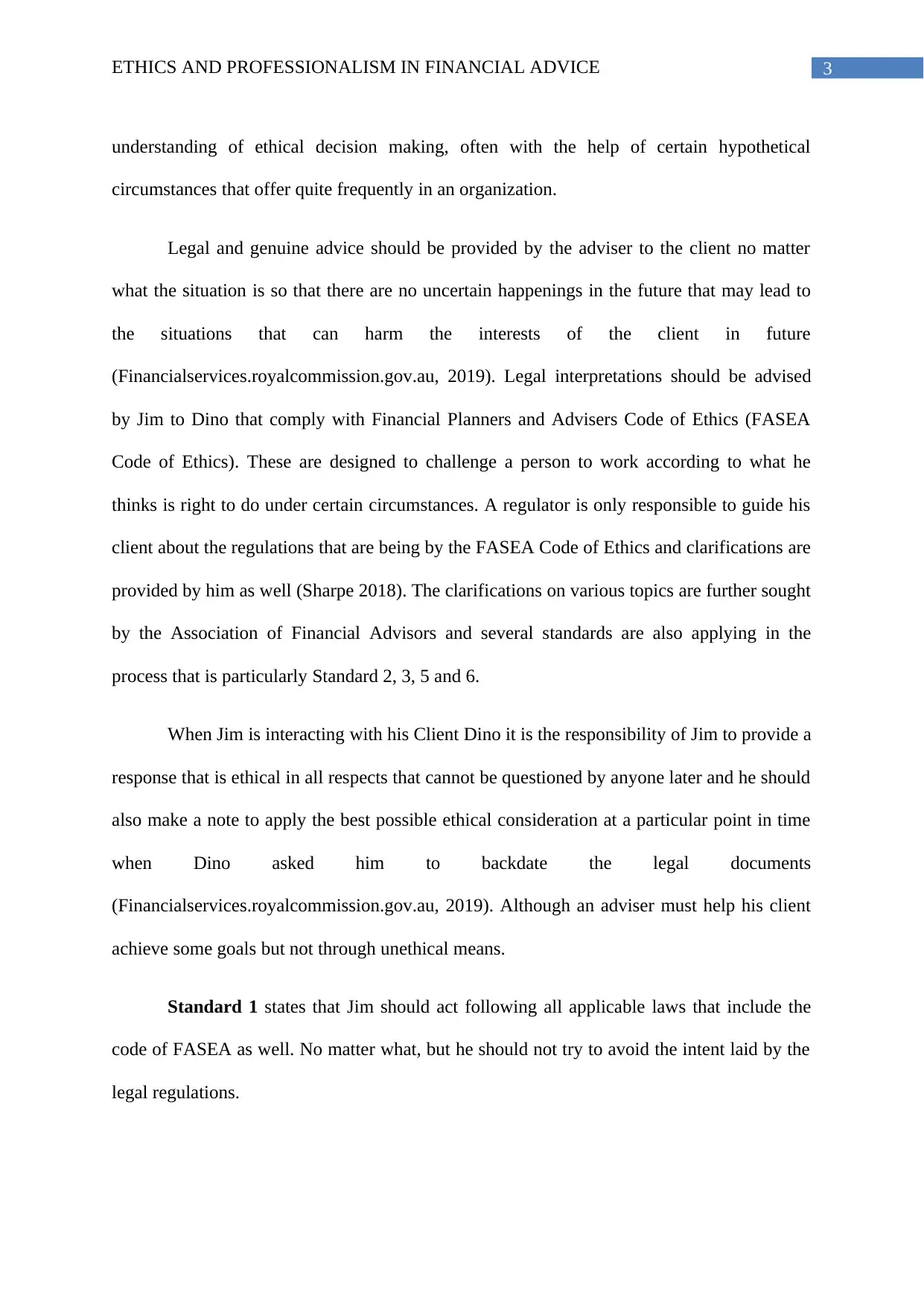
3ETHICS AND PROFESSIONALISM IN FINANCIAL ADVICE
understanding of ethical decision making, often with the help of certain hypothetical
circumstances that offer quite frequently in an organization.
Legal and genuine advice should be provided by the adviser to the client no matter
what the situation is so that there are no uncertain happenings in the future that may lead to
the situations that can harm the interests of the client in future
(Financialservices.royalcommission.gov.au, 2019). Legal interpretations should be advised
by Jim to Dino that comply with Financial Planners and Advisers Code of Ethics (FASEA
Code of Ethics). These are designed to challenge a person to work according to what he
thinks is right to do under certain circumstances. A regulator is only responsible to guide his
client about the regulations that are being by the FASEA Code of Ethics and clarifications are
provided by him as well (Sharpe 2018). The clarifications on various topics are further sought
by the Association of Financial Advisors and several standards are also applying in the
process that is particularly Standard 2, 3, 5 and 6.
When Jim is interacting with his Client Dino it is the responsibility of Jim to provide a
response that is ethical in all respects that cannot be questioned by anyone later and he should
also make a note to apply the best possible ethical consideration at a particular point in time
when Dino asked him to backdate the legal documents
(Financialservices.royalcommission.gov.au, 2019). Although an adviser must help his client
achieve some goals but not through unethical means.
Standard 1 states that Jim should act following all applicable laws that include the
code of FASEA as well. No matter what, but he should not try to avoid the intent laid by the
legal regulations.
understanding of ethical decision making, often with the help of certain hypothetical
circumstances that offer quite frequently in an organization.
Legal and genuine advice should be provided by the adviser to the client no matter
what the situation is so that there are no uncertain happenings in the future that may lead to
the situations that can harm the interests of the client in future
(Financialservices.royalcommission.gov.au, 2019). Legal interpretations should be advised
by Jim to Dino that comply with Financial Planners and Advisers Code of Ethics (FASEA
Code of Ethics). These are designed to challenge a person to work according to what he
thinks is right to do under certain circumstances. A regulator is only responsible to guide his
client about the regulations that are being by the FASEA Code of Ethics and clarifications are
provided by him as well (Sharpe 2018). The clarifications on various topics are further sought
by the Association of Financial Advisors and several standards are also applying in the
process that is particularly Standard 2, 3, 5 and 6.
When Jim is interacting with his Client Dino it is the responsibility of Jim to provide a
response that is ethical in all respects that cannot be questioned by anyone later and he should
also make a note to apply the best possible ethical consideration at a particular point in time
when Dino asked him to backdate the legal documents
(Financialservices.royalcommission.gov.au, 2019). Although an adviser must help his client
achieve some goals but not through unethical means.
Standard 1 states that Jim should act following all applicable laws that include the
code of FASEA as well. No matter what, but he should not try to avoid the intent laid by the
legal regulations.
Secure Best Marks with AI Grader
Need help grading? Try our AI Grader for instant feedback on your assignments.
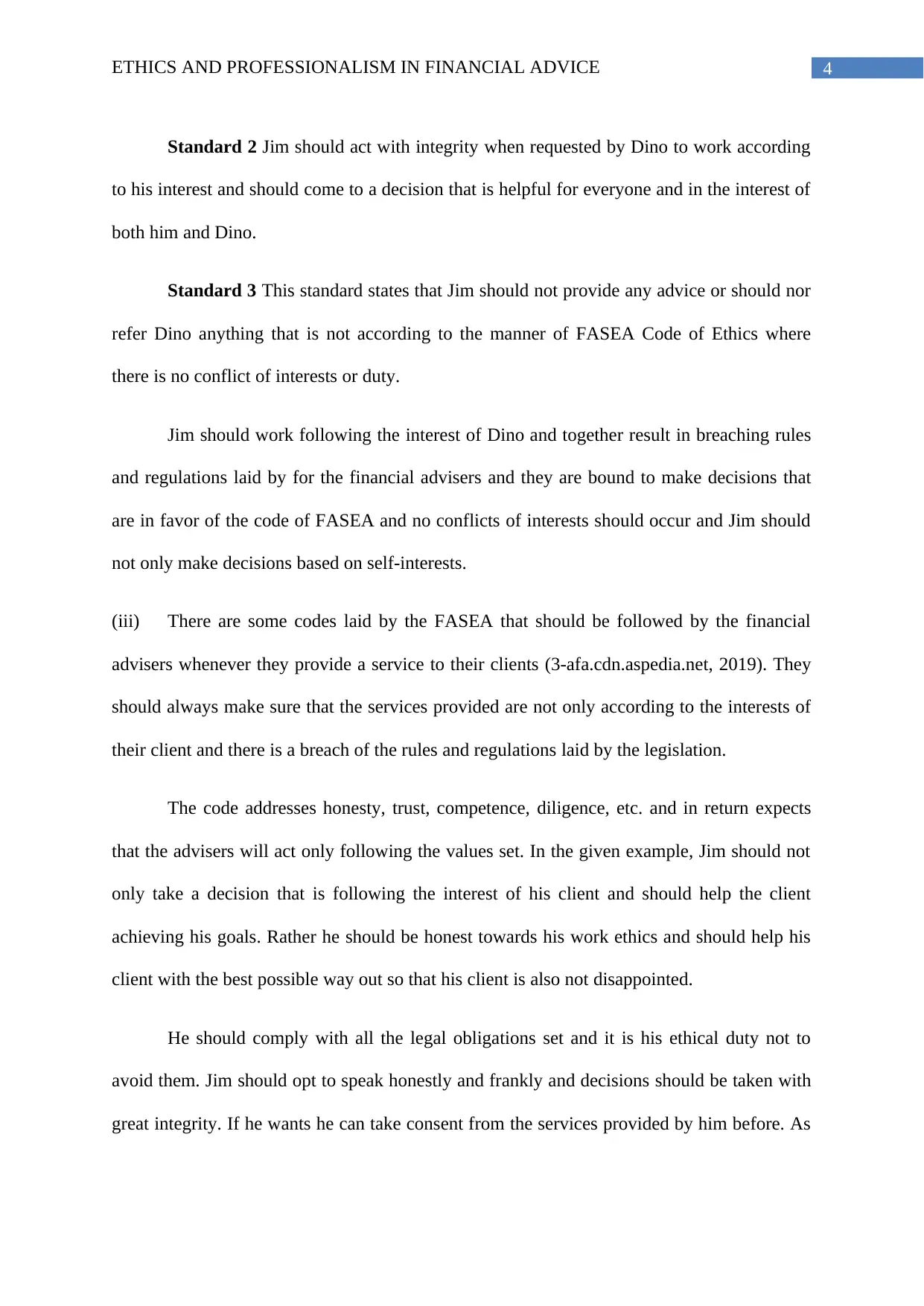
4ETHICS AND PROFESSIONALISM IN FINANCIAL ADVICE
Standard 2 Jim should act with integrity when requested by Dino to work according
to his interest and should come to a decision that is helpful for everyone and in the interest of
both him and Dino.
Standard 3 This standard states that Jim should not provide any advice or should nor
refer Dino anything that is not according to the manner of FASEA Code of Ethics where
there is no conflict of interests or duty.
Jim should work following the interest of Dino and together result in breaching rules
and regulations laid by for the financial advisers and they are bound to make decisions that
are in favor of the code of FASEA and no conflicts of interests should occur and Jim should
not only make decisions based on self-interests.
(iii) There are some codes laid by the FASEA that should be followed by the financial
advisers whenever they provide a service to their clients (3-afa.cdn.aspedia.net, 2019). They
should always make sure that the services provided are not only according to the interests of
their client and there is a breach of the rules and regulations laid by the legislation.
The code addresses honesty, trust, competence, diligence, etc. and in return expects
that the advisers will act only following the values set. In the given example, Jim should not
only take a decision that is following the interest of his client and should help the client
achieving his goals. Rather he should be honest towards his work ethics and should help his
client with the best possible way out so that his client is also not disappointed.
He should comply with all the legal obligations set and it is his ethical duty not to
avoid them. Jim should opt to speak honestly and frankly and decisions should be taken with
great integrity. If he wants he can take consent from the services provided by him before. As
Standard 2 Jim should act with integrity when requested by Dino to work according
to his interest and should come to a decision that is helpful for everyone and in the interest of
both him and Dino.
Standard 3 This standard states that Jim should not provide any advice or should nor
refer Dino anything that is not according to the manner of FASEA Code of Ethics where
there is no conflict of interests or duty.
Jim should work following the interest of Dino and together result in breaching rules
and regulations laid by for the financial advisers and they are bound to make decisions that
are in favor of the code of FASEA and no conflicts of interests should occur and Jim should
not only make decisions based on self-interests.
(iii) There are some codes laid by the FASEA that should be followed by the financial
advisers whenever they provide a service to their clients (3-afa.cdn.aspedia.net, 2019). They
should always make sure that the services provided are not only according to the interests of
their client and there is a breach of the rules and regulations laid by the legislation.
The code addresses honesty, trust, competence, diligence, etc. and in return expects
that the advisers will act only following the values set. In the given example, Jim should not
only take a decision that is following the interest of his client and should help the client
achieving his goals. Rather he should be honest towards his work ethics and should help his
client with the best possible way out so that his client is also not disappointed.
He should comply with all the legal obligations set and it is his ethical duty not to
avoid them. Jim should opt to speak honestly and frankly and decisions should be taken with
great integrity. If he wants he can take consent from the services provided by him before. As
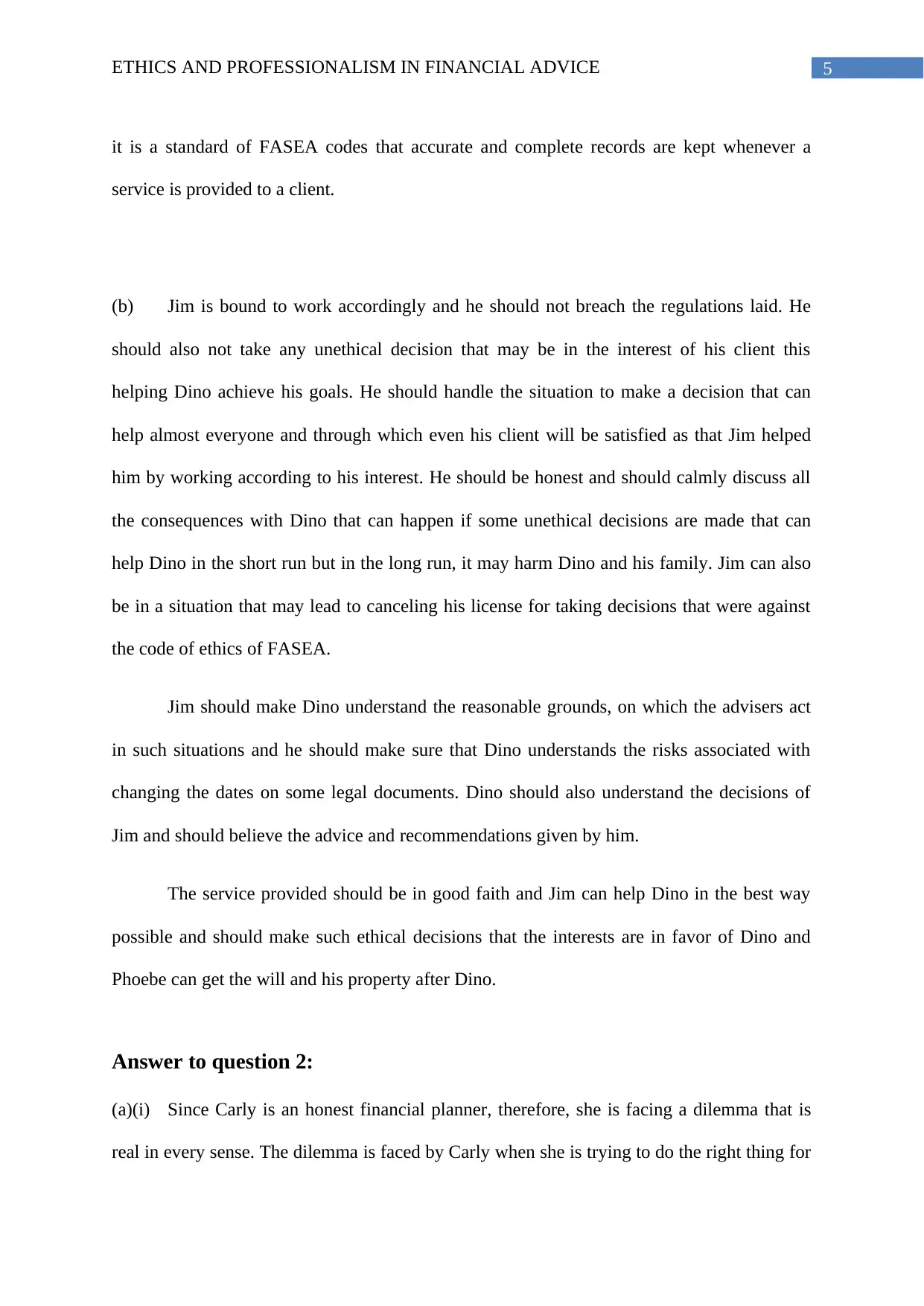
5ETHICS AND PROFESSIONALISM IN FINANCIAL ADVICE
it is a standard of FASEA codes that accurate and complete records are kept whenever a
service is provided to a client.
(b) Jim is bound to work accordingly and he should not breach the regulations laid. He
should also not take any unethical decision that may be in the interest of his client this
helping Dino achieve his goals. He should handle the situation to make a decision that can
help almost everyone and through which even his client will be satisfied as that Jim helped
him by working according to his interest. He should be honest and should calmly discuss all
the consequences with Dino that can happen if some unethical decisions are made that can
help Dino in the short run but in the long run, it may harm Dino and his family. Jim can also
be in a situation that may lead to canceling his license for taking decisions that were against
the code of ethics of FASEA.
Jim should make Dino understand the reasonable grounds, on which the advisers act
in such situations and he should make sure that Dino understands the risks associated with
changing the dates on some legal documents. Dino should also understand the decisions of
Jim and should believe the advice and recommendations given by him.
The service provided should be in good faith and Jim can help Dino in the best way
possible and should make such ethical decisions that the interests are in favor of Dino and
Phoebe can get the will and his property after Dino.
Answer to question 2:
(a)(i) Since Carly is an honest financial planner, therefore, she is facing a dilemma that is
real in every sense. The dilemma is faced by Carly when she is trying to do the right thing for
it is a standard of FASEA codes that accurate and complete records are kept whenever a
service is provided to a client.
(b) Jim is bound to work accordingly and he should not breach the regulations laid. He
should also not take any unethical decision that may be in the interest of his client this
helping Dino achieve his goals. He should handle the situation to make a decision that can
help almost everyone and through which even his client will be satisfied as that Jim helped
him by working according to his interest. He should be honest and should calmly discuss all
the consequences with Dino that can happen if some unethical decisions are made that can
help Dino in the short run but in the long run, it may harm Dino and his family. Jim can also
be in a situation that may lead to canceling his license for taking decisions that were against
the code of ethics of FASEA.
Jim should make Dino understand the reasonable grounds, on which the advisers act
in such situations and he should make sure that Dino understands the risks associated with
changing the dates on some legal documents. Dino should also understand the decisions of
Jim and should believe the advice and recommendations given by him.
The service provided should be in good faith and Jim can help Dino in the best way
possible and should make such ethical decisions that the interests are in favor of Dino and
Phoebe can get the will and his property after Dino.
Answer to question 2:
(a)(i) Since Carly is an honest financial planner, therefore, she is facing a dilemma that is
real in every sense. The dilemma is faced by Carly when she is trying to do the right thing for
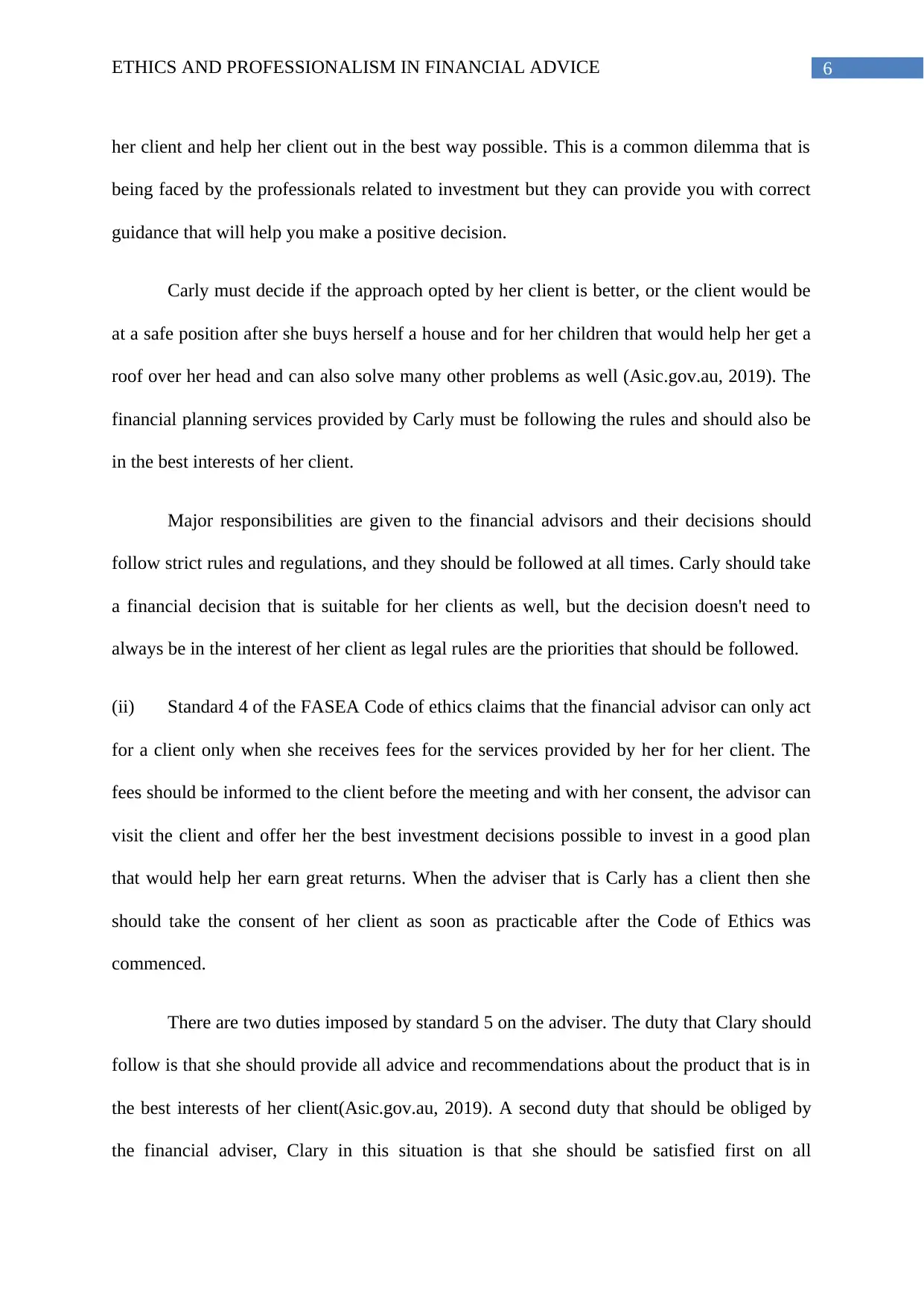
6ETHICS AND PROFESSIONALISM IN FINANCIAL ADVICE
her client and help her client out in the best way possible. This is a common dilemma that is
being faced by the professionals related to investment but they can provide you with correct
guidance that will help you make a positive decision.
Carly must decide if the approach opted by her client is better, or the client would be
at a safe position after she buys herself a house and for her children that would help her get a
roof over her head and can also solve many other problems as well (Asic.gov.au, 2019). The
financial planning services provided by Carly must be following the rules and should also be
in the best interests of her client.
Major responsibilities are given to the financial advisors and their decisions should
follow strict rules and regulations, and they should be followed at all times. Carly should take
a financial decision that is suitable for her clients as well, but the decision doesn't need to
always be in the interest of her client as legal rules are the priorities that should be followed.
(ii) Standard 4 of the FASEA Code of ethics claims that the financial advisor can only act
for a client only when she receives fees for the services provided by her for her client. The
fees should be informed to the client before the meeting and with her consent, the advisor can
visit the client and offer her the best investment decisions possible to invest in a good plan
that would help her earn great returns. When the adviser that is Carly has a client then she
should take the consent of her client as soon as practicable after the Code of Ethics was
commenced.
There are two duties imposed by standard 5 on the adviser. The duty that Clary should
follow is that she should provide all advice and recommendations about the product that is in
the best interests of her client(Asic.gov.au, 2019). A second duty that should be obliged by
the financial adviser, Clary in this situation is that she should be satisfied first on all
her client and help her client out in the best way possible. This is a common dilemma that is
being faced by the professionals related to investment but they can provide you with correct
guidance that will help you make a positive decision.
Carly must decide if the approach opted by her client is better, or the client would be
at a safe position after she buys herself a house and for her children that would help her get a
roof over her head and can also solve many other problems as well (Asic.gov.au, 2019). The
financial planning services provided by Carly must be following the rules and should also be
in the best interests of her client.
Major responsibilities are given to the financial advisors and their decisions should
follow strict rules and regulations, and they should be followed at all times. Carly should take
a financial decision that is suitable for her clients as well, but the decision doesn't need to
always be in the interest of her client as legal rules are the priorities that should be followed.
(ii) Standard 4 of the FASEA Code of ethics claims that the financial advisor can only act
for a client only when she receives fees for the services provided by her for her client. The
fees should be informed to the client before the meeting and with her consent, the advisor can
visit the client and offer her the best investment decisions possible to invest in a good plan
that would help her earn great returns. When the adviser that is Carly has a client then she
should take the consent of her client as soon as practicable after the Code of Ethics was
commenced.
There are two duties imposed by standard 5 on the adviser. The duty that Clary should
follow is that she should provide all advice and recommendations about the product that is in
the best interests of her client(Asic.gov.au, 2019). A second duty that should be obliged by
the financial adviser, Clary in this situation is that she should be satisfied first on all
Paraphrase This Document
Need a fresh take? Get an instant paraphrase of this document with our AI Paraphraser
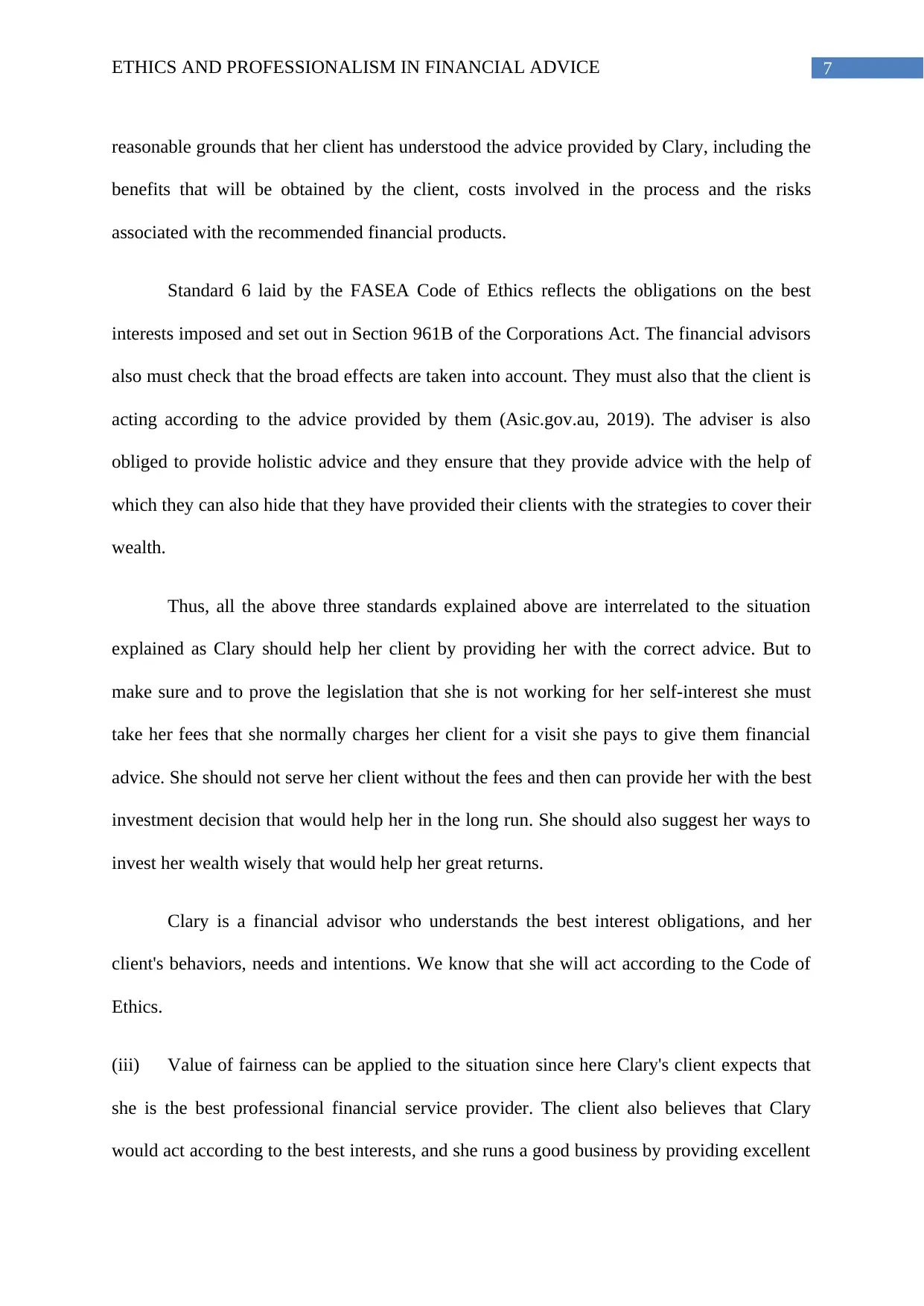
7ETHICS AND PROFESSIONALISM IN FINANCIAL ADVICE
reasonable grounds that her client has understood the advice provided by Clary, including the
benefits that will be obtained by the client, costs involved in the process and the risks
associated with the recommended financial products.
Standard 6 laid by the FASEA Code of Ethics reflects the obligations on the best
interests imposed and set out in Section 961B of the Corporations Act. The financial advisors
also must check that the broad effects are taken into account. They must also that the client is
acting according to the advice provided by them (Asic.gov.au, 2019). The adviser is also
obliged to provide holistic advice and they ensure that they provide advice with the help of
which they can also hide that they have provided their clients with the strategies to cover their
wealth.
Thus, all the above three standards explained above are interrelated to the situation
explained as Clary should help her client by providing her with the correct advice. But to
make sure and to prove the legislation that she is not working for her self-interest she must
take her fees that she normally charges her client for a visit she pays to give them financial
advice. She should not serve her client without the fees and then can provide her with the best
investment decision that would help her in the long run. She should also suggest her ways to
invest her wealth wisely that would help her great returns.
Clary is a financial advisor who understands the best interest obligations, and her
client's behaviors, needs and intentions. We know that she will act according to the Code of
Ethics.
(iii) Value of fairness can be applied to the situation since here Clary's client expects that
she is the best professional financial service provider. The client also believes that Clary
would act according to the best interests, and she runs a good business by providing excellent
reasonable grounds that her client has understood the advice provided by Clary, including the
benefits that will be obtained by the client, costs involved in the process and the risks
associated with the recommended financial products.
Standard 6 laid by the FASEA Code of Ethics reflects the obligations on the best
interests imposed and set out in Section 961B of the Corporations Act. The financial advisors
also must check that the broad effects are taken into account. They must also that the client is
acting according to the advice provided by them (Asic.gov.au, 2019). The adviser is also
obliged to provide holistic advice and they ensure that they provide advice with the help of
which they can also hide that they have provided their clients with the strategies to cover their
wealth.
Thus, all the above three standards explained above are interrelated to the situation
explained as Clary should help her client by providing her with the correct advice. But to
make sure and to prove the legislation that she is not working for her self-interest she must
take her fees that she normally charges her client for a visit she pays to give them financial
advice. She should not serve her client without the fees and then can provide her with the best
investment decision that would help her in the long run. She should also suggest her ways to
invest her wealth wisely that would help her great returns.
Clary is a financial advisor who understands the best interest obligations, and her
client's behaviors, needs and intentions. We know that she will act according to the Code of
Ethics.
(iii) Value of fairness can be applied to the situation since here Clary's client expects that
she is the best professional financial service provider. The client also believes that Clary
would act according to the best interests, and she runs a good business by providing excellent
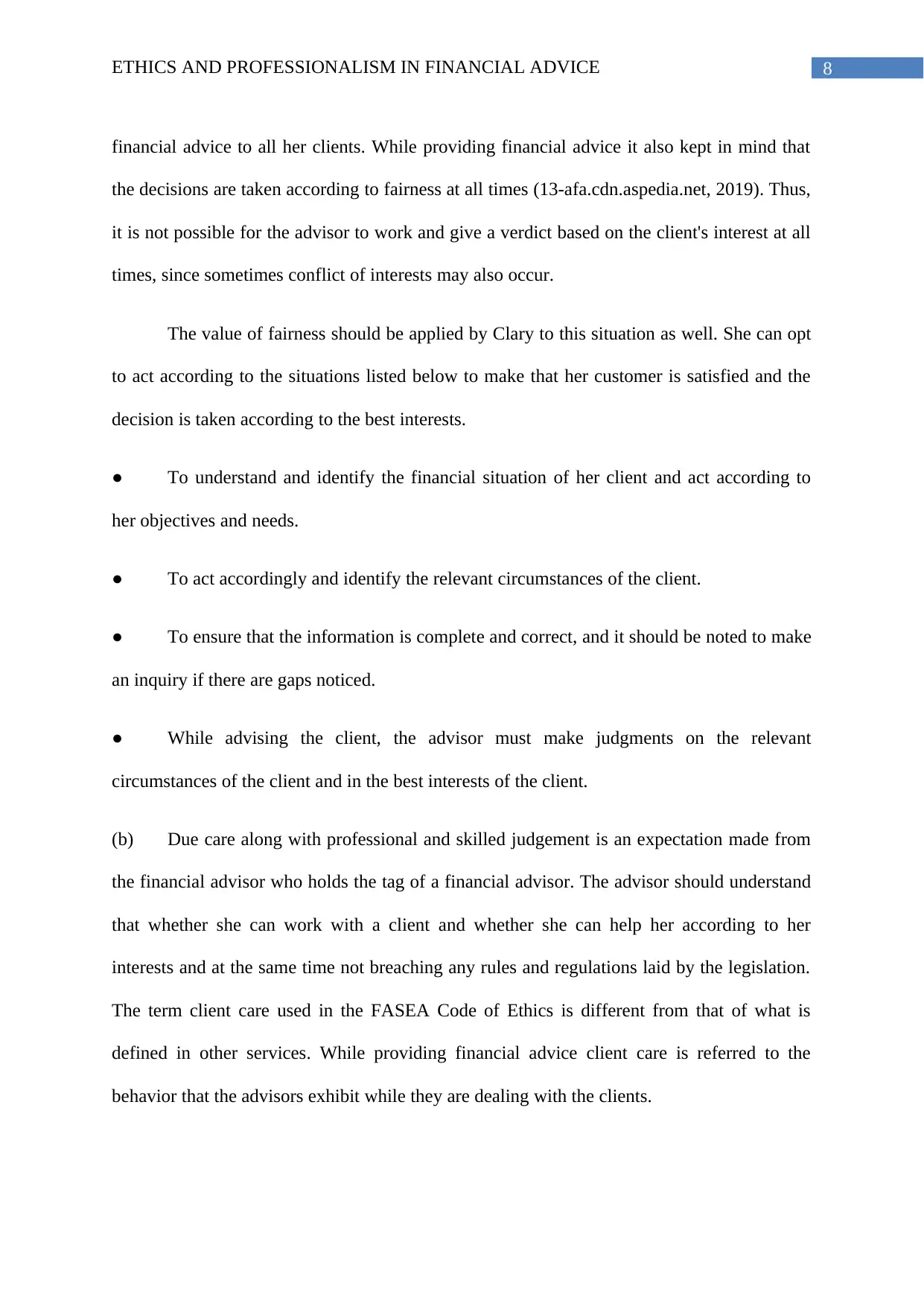
8ETHICS AND PROFESSIONALISM IN FINANCIAL ADVICE
financial advice to all her clients. While providing financial advice it also kept in mind that
the decisions are taken according to fairness at all times (13-afa.cdn.aspedia.net, 2019). Thus,
it is not possible for the advisor to work and give a verdict based on the client's interest at all
times, since sometimes conflict of interests may also occur.
The value of fairness should be applied by Clary to this situation as well. She can opt
to act according to the situations listed below to make that her customer is satisfied and the
decision is taken according to the best interests.
● To understand and identify the financial situation of her client and act according to
her objectives and needs.
● To act accordingly and identify the relevant circumstances of the client.
● To ensure that the information is complete and correct, and it should be noted to make
an inquiry if there are gaps noticed.
● While advising the client, the advisor must make judgments on the relevant
circumstances of the client and in the best interests of the client.
(b) Due care along with professional and skilled judgement is an expectation made from
the financial advisor who holds the tag of a financial advisor. The advisor should understand
that whether she can work with a client and whether she can help her according to her
interests and at the same time not breaching any rules and regulations laid by the legislation.
The term client care used in the FASEA Code of Ethics is different from that of what is
defined in other services. While providing financial advice client care is referred to the
behavior that the advisors exhibit while they are dealing with the clients.
financial advice to all her clients. While providing financial advice it also kept in mind that
the decisions are taken according to fairness at all times (13-afa.cdn.aspedia.net, 2019). Thus,
it is not possible for the advisor to work and give a verdict based on the client's interest at all
times, since sometimes conflict of interests may also occur.
The value of fairness should be applied by Clary to this situation as well. She can opt
to act according to the situations listed below to make that her customer is satisfied and the
decision is taken according to the best interests.
● To understand and identify the financial situation of her client and act according to
her objectives and needs.
● To act accordingly and identify the relevant circumstances of the client.
● To ensure that the information is complete and correct, and it should be noted to make
an inquiry if there are gaps noticed.
● While advising the client, the advisor must make judgments on the relevant
circumstances of the client and in the best interests of the client.
(b) Due care along with professional and skilled judgement is an expectation made from
the financial advisor who holds the tag of a financial advisor. The advisor should understand
that whether she can work with a client and whether she can help her according to her
interests and at the same time not breaching any rules and regulations laid by the legislation.
The term client care used in the FASEA Code of Ethics is different from that of what is
defined in other services. While providing financial advice client care is referred to the
behavior that the advisors exhibit while they are dealing with the clients.
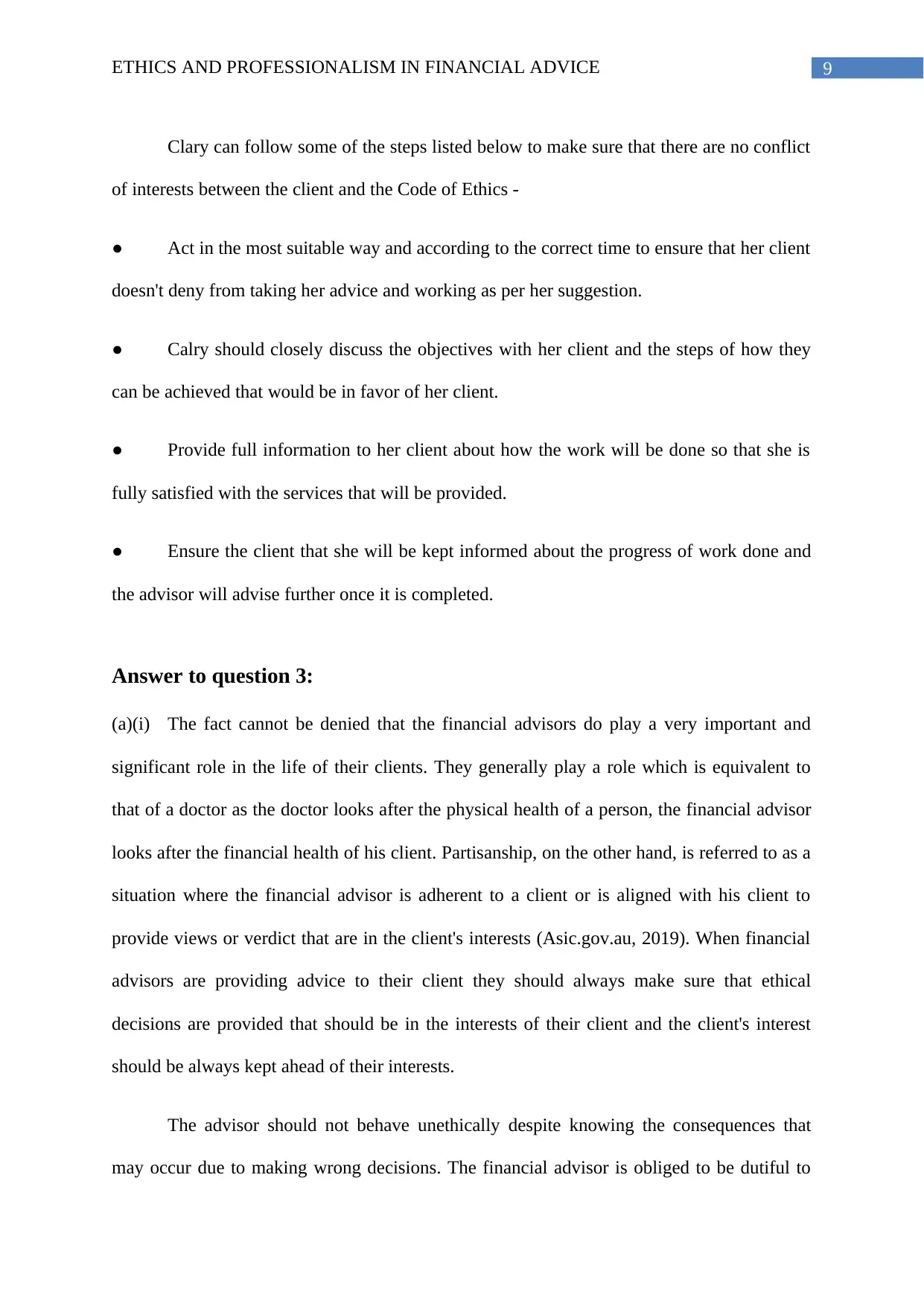
9ETHICS AND PROFESSIONALISM IN FINANCIAL ADVICE
Clary can follow some of the steps listed below to make sure that there are no conflict
of interests between the client and the Code of Ethics -
● Act in the most suitable way and according to the correct time to ensure that her client
doesn't deny from taking her advice and working as per her suggestion.
● Calry should closely discuss the objectives with her client and the steps of how they
can be achieved that would be in favor of her client.
● Provide full information to her client about how the work will be done so that she is
fully satisfied with the services that will be provided.
● Ensure the client that she will be kept informed about the progress of work done and
the advisor will advise further once it is completed.
Answer to question 3:
(a)(i) The fact cannot be denied that the financial advisors do play a very important and
significant role in the life of their clients. They generally play a role which is equivalent to
that of a doctor as the doctor looks after the physical health of a person, the financial advisor
looks after the financial health of his client. Partisanship, on the other hand, is referred to as a
situation where the financial advisor is adherent to a client or is aligned with his client to
provide views or verdict that are in the client's interests (Asic.gov.au, 2019). When financial
advisors are providing advice to their client they should always make sure that ethical
decisions are provided that should be in the interests of their client and the client's interest
should be always kept ahead of their interests.
The advisor should not behave unethically despite knowing the consequences that
may occur due to making wrong decisions. The financial advisor is obliged to be dutiful to
Clary can follow some of the steps listed below to make sure that there are no conflict
of interests between the client and the Code of Ethics -
● Act in the most suitable way and according to the correct time to ensure that her client
doesn't deny from taking her advice and working as per her suggestion.
● Calry should closely discuss the objectives with her client and the steps of how they
can be achieved that would be in favor of her client.
● Provide full information to her client about how the work will be done so that she is
fully satisfied with the services that will be provided.
● Ensure the client that she will be kept informed about the progress of work done and
the advisor will advise further once it is completed.
Answer to question 3:
(a)(i) The fact cannot be denied that the financial advisors do play a very important and
significant role in the life of their clients. They generally play a role which is equivalent to
that of a doctor as the doctor looks after the physical health of a person, the financial advisor
looks after the financial health of his client. Partisanship, on the other hand, is referred to as a
situation where the financial advisor is adherent to a client or is aligned with his client to
provide views or verdict that are in the client's interests (Asic.gov.au, 2019). When financial
advisors are providing advice to their client they should always make sure that ethical
decisions are provided that should be in the interests of their client and the client's interest
should be always kept ahead of their interests.
The advisor should not behave unethically despite knowing the consequences that
may occur due to making wrong decisions. The financial advisor is obliged to be dutiful to
Secure Best Marks with AI Grader
Need help grading? Try our AI Grader for instant feedback on your assignments.
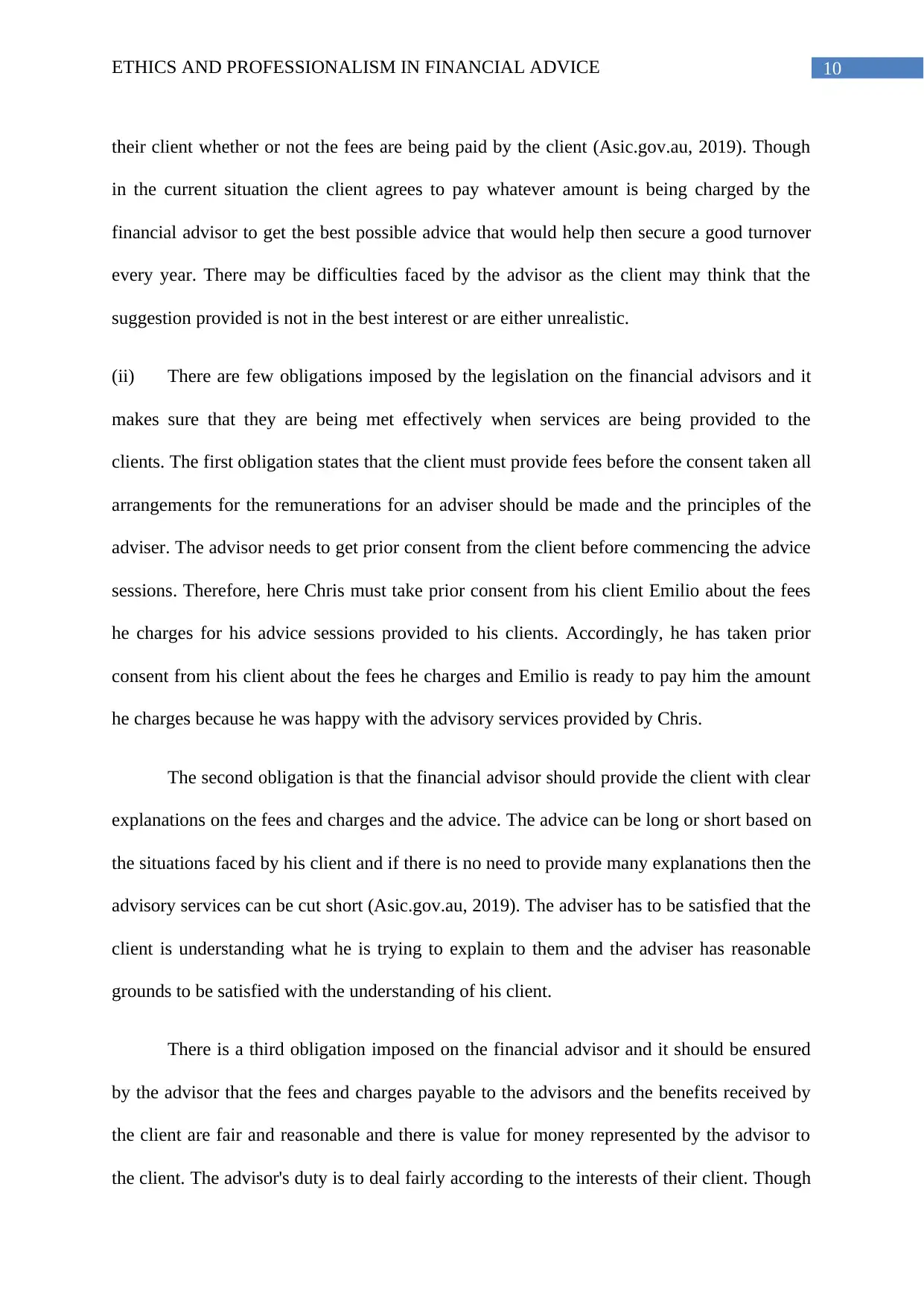
10ETHICS AND PROFESSIONALISM IN FINANCIAL ADVICE
their client whether or not the fees are being paid by the client (Asic.gov.au, 2019). Though
in the current situation the client agrees to pay whatever amount is being charged by the
financial advisor to get the best possible advice that would help then secure a good turnover
every year. There may be difficulties faced by the advisor as the client may think that the
suggestion provided is not in the best interest or are either unrealistic.
(ii) There are few obligations imposed by the legislation on the financial advisors and it
makes sure that they are being met effectively when services are being provided to the
clients. The first obligation states that the client must provide fees before the consent taken all
arrangements for the remunerations for an adviser should be made and the principles of the
adviser. The advisor needs to get prior consent from the client before commencing the advice
sessions. Therefore, here Chris must take prior consent from his client Emilio about the fees
he charges for his advice sessions provided to his clients. Accordingly, he has taken prior
consent from his client about the fees he charges and Emilio is ready to pay him the amount
he charges because he was happy with the advisory services provided by Chris.
The second obligation is that the financial advisor should provide the client with clear
explanations on the fees and charges and the advice. The advice can be long or short based on
the situations faced by his client and if there is no need to provide many explanations then the
advisory services can be cut short (Asic.gov.au, 2019). The adviser has to be satisfied that the
client is understanding what he is trying to explain to them and the adviser has reasonable
grounds to be satisfied with the understanding of his client.
There is a third obligation imposed on the financial advisor and it should be ensured
by the advisor that the fees and charges payable to the advisors and the benefits received by
the client are fair and reasonable and there is value for money represented by the advisor to
the client. The advisor's duty is to deal fairly according to the interests of their client. Though
their client whether or not the fees are being paid by the client (Asic.gov.au, 2019). Though
in the current situation the client agrees to pay whatever amount is being charged by the
financial advisor to get the best possible advice that would help then secure a good turnover
every year. There may be difficulties faced by the advisor as the client may think that the
suggestion provided is not in the best interest or are either unrealistic.
(ii) There are few obligations imposed by the legislation on the financial advisors and it
makes sure that they are being met effectively when services are being provided to the
clients. The first obligation states that the client must provide fees before the consent taken all
arrangements for the remunerations for an adviser should be made and the principles of the
adviser. The advisor needs to get prior consent from the client before commencing the advice
sessions. Therefore, here Chris must take prior consent from his client Emilio about the fees
he charges for his advice sessions provided to his clients. Accordingly, he has taken prior
consent from his client about the fees he charges and Emilio is ready to pay him the amount
he charges because he was happy with the advisory services provided by Chris.
The second obligation is that the financial advisor should provide the client with clear
explanations on the fees and charges and the advice. The advice can be long or short based on
the situations faced by his client and if there is no need to provide many explanations then the
advisory services can be cut short (Asic.gov.au, 2019). The adviser has to be satisfied that the
client is understanding what he is trying to explain to them and the adviser has reasonable
grounds to be satisfied with the understanding of his client.
There is a third obligation imposed on the financial advisor and it should be ensured
by the advisor that the fees and charges payable to the advisors and the benefits received by
the client are fair and reasonable and there is value for money represented by the advisor to
the client. The advisor's duty is to deal fairly according to the interests of their client. Though
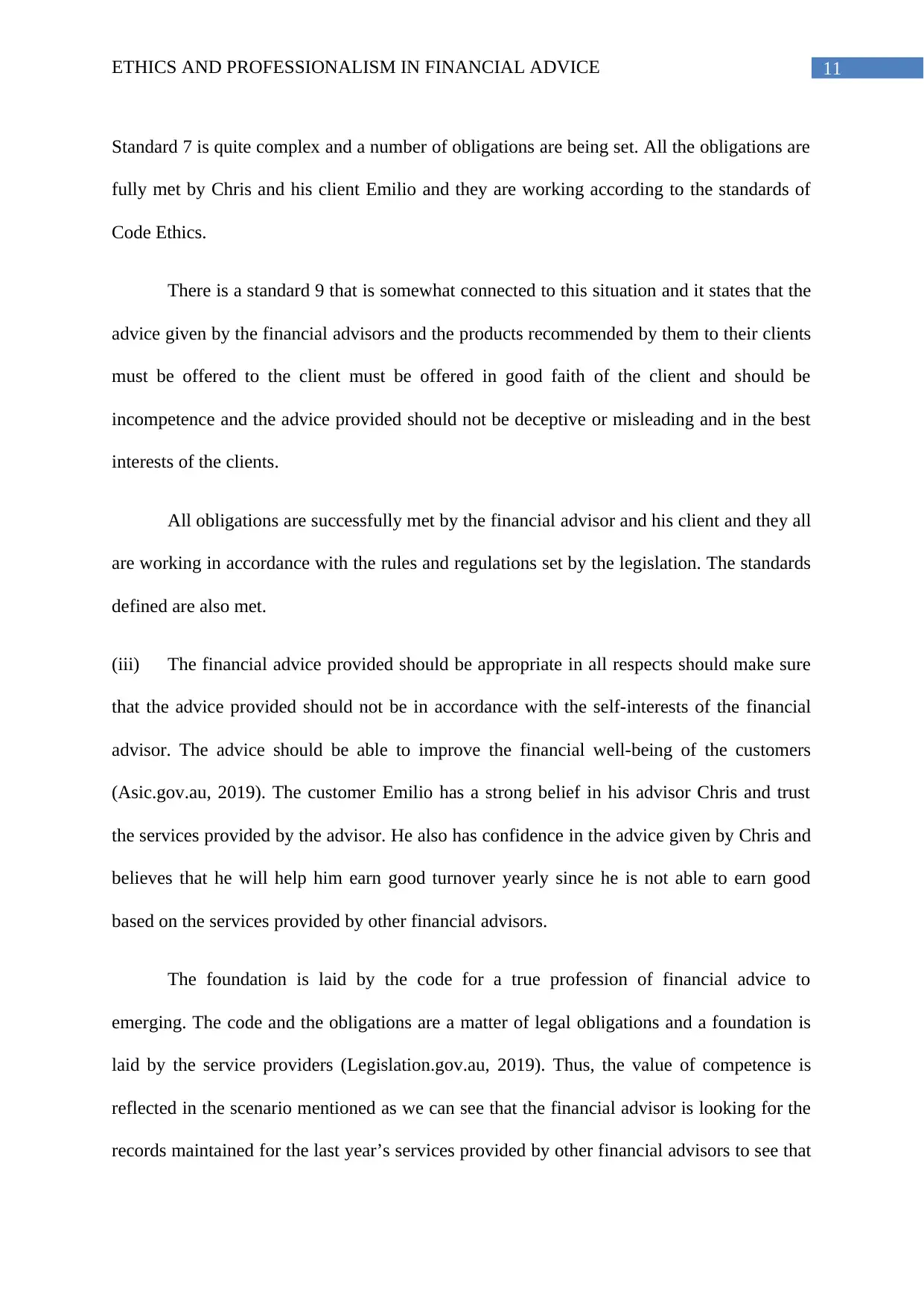
11ETHICS AND PROFESSIONALISM IN FINANCIAL ADVICE
Standard 7 is quite complex and a number of obligations are being set. All the obligations are
fully met by Chris and his client Emilio and they are working according to the standards of
Code Ethics.
There is a standard 9 that is somewhat connected to this situation and it states that the
advice given by the financial advisors and the products recommended by them to their clients
must be offered to the client must be offered in good faith of the client and should be
incompetence and the advice provided should not be deceptive or misleading and in the best
interests of the clients.
All obligations are successfully met by the financial advisor and his client and they all
are working in accordance with the rules and regulations set by the legislation. The standards
defined are also met.
(iii) The financial advice provided should be appropriate in all respects should make sure
that the advice provided should not be in accordance with the self-interests of the financial
advisor. The advice should be able to improve the financial well-being of the customers
(Asic.gov.au, 2019). The customer Emilio has a strong belief in his advisor Chris and trust
the services provided by the advisor. He also has confidence in the advice given by Chris and
believes that he will help him earn good turnover yearly since he is not able to earn good
based on the services provided by other financial advisors.
The foundation is laid by the code for a true profession of financial advice to
emerging. The code and the obligations are a matter of legal obligations and a foundation is
laid by the service providers (Legislation.gov.au, 2019). Thus, the value of competence is
reflected in the scenario mentioned as we can see that the financial advisor is looking for the
records maintained for the last year’s services provided by other financial advisors to see that
Standard 7 is quite complex and a number of obligations are being set. All the obligations are
fully met by Chris and his client Emilio and they are working according to the standards of
Code Ethics.
There is a standard 9 that is somewhat connected to this situation and it states that the
advice given by the financial advisors and the products recommended by them to their clients
must be offered to the client must be offered in good faith of the client and should be
incompetence and the advice provided should not be deceptive or misleading and in the best
interests of the clients.
All obligations are successfully met by the financial advisor and his client and they all
are working in accordance with the rules and regulations set by the legislation. The standards
defined are also met.
(iii) The financial advice provided should be appropriate in all respects should make sure
that the advice provided should not be in accordance with the self-interests of the financial
advisor. The advice should be able to improve the financial well-being of the customers
(Asic.gov.au, 2019). The customer Emilio has a strong belief in his advisor Chris and trust
the services provided by the advisor. He also has confidence in the advice given by Chris and
believes that he will help him earn good turnover yearly since he is not able to earn good
based on the services provided by other financial advisors.
The foundation is laid by the code for a true profession of financial advice to
emerging. The code and the obligations are a matter of legal obligations and a foundation is
laid by the service providers (Legislation.gov.au, 2019). Thus, the value of competence is
reflected in the scenario mentioned as we can see that the financial advisor is looking for the
records maintained for the last year’s services provided by other financial advisors to see that
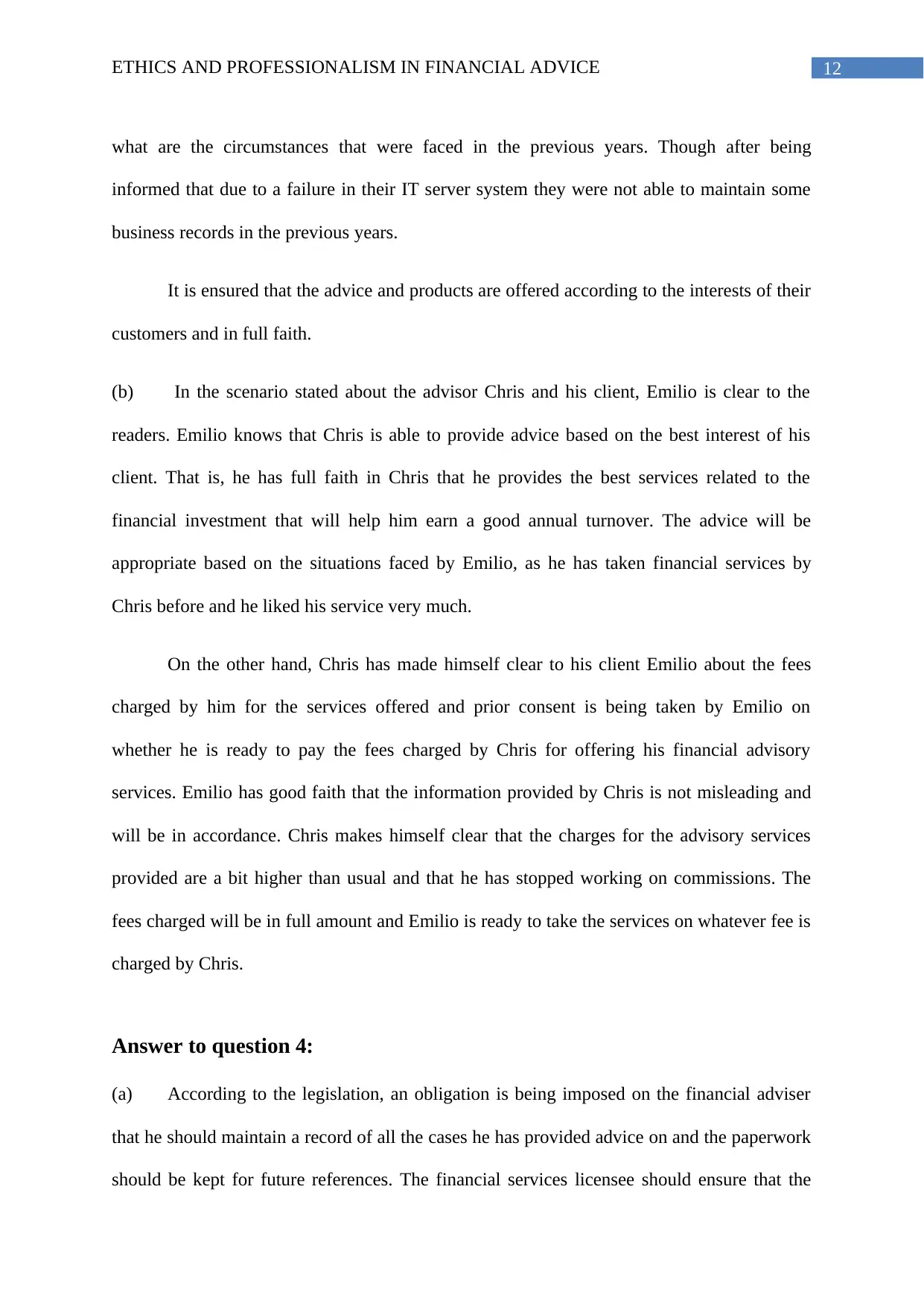
12ETHICS AND PROFESSIONALISM IN FINANCIAL ADVICE
what are the circumstances that were faced in the previous years. Though after being
informed that due to a failure in their IT server system they were not able to maintain some
business records in the previous years.
It is ensured that the advice and products are offered according to the interests of their
customers and in full faith.
(b) In the scenario stated about the advisor Chris and his client, Emilio is clear to the
readers. Emilio knows that Chris is able to provide advice based on the best interest of his
client. That is, he has full faith in Chris that he provides the best services related to the
financial investment that will help him earn a good annual turnover. The advice will be
appropriate based on the situations faced by Emilio, as he has taken financial services by
Chris before and he liked his service very much.
On the other hand, Chris has made himself clear to his client Emilio about the fees
charged by him for the services offered and prior consent is being taken by Emilio on
whether he is ready to pay the fees charged by Chris for offering his financial advisory
services. Emilio has good faith that the information provided by Chris is not misleading and
will be in accordance. Chris makes himself clear that the charges for the advisory services
provided are a bit higher than usual and that he has stopped working on commissions. The
fees charged will be in full amount and Emilio is ready to take the services on whatever fee is
charged by Chris.
Answer to question 4:
(a) According to the legislation, an obligation is being imposed on the financial adviser
that he should maintain a record of all the cases he has provided advice on and the paperwork
should be kept for future references. The financial services licensee should ensure that the
what are the circumstances that were faced in the previous years. Though after being
informed that due to a failure in their IT server system they were not able to maintain some
business records in the previous years.
It is ensured that the advice and products are offered according to the interests of their
customers and in full faith.
(b) In the scenario stated about the advisor Chris and his client, Emilio is clear to the
readers. Emilio knows that Chris is able to provide advice based on the best interest of his
client. That is, he has full faith in Chris that he provides the best services related to the
financial investment that will help him earn a good annual turnover. The advice will be
appropriate based on the situations faced by Emilio, as he has taken financial services by
Chris before and he liked his service very much.
On the other hand, Chris has made himself clear to his client Emilio about the fees
charged by him for the services offered and prior consent is being taken by Emilio on
whether he is ready to pay the fees charged by Chris for offering his financial advisory
services. Emilio has good faith that the information provided by Chris is not misleading and
will be in accordance. Chris makes himself clear that the charges for the advisory services
provided are a bit higher than usual and that he has stopped working on commissions. The
fees charged will be in full amount and Emilio is ready to take the services on whatever fee is
charged by Chris.
Answer to question 4:
(a) According to the legislation, an obligation is being imposed on the financial adviser
that he should maintain a record of all the cases he has provided advice on and the paperwork
should be kept for future references. The financial services licensee should ensure that the
Paraphrase This Document
Need a fresh take? Get an instant paraphrase of this document with our AI Paraphraser
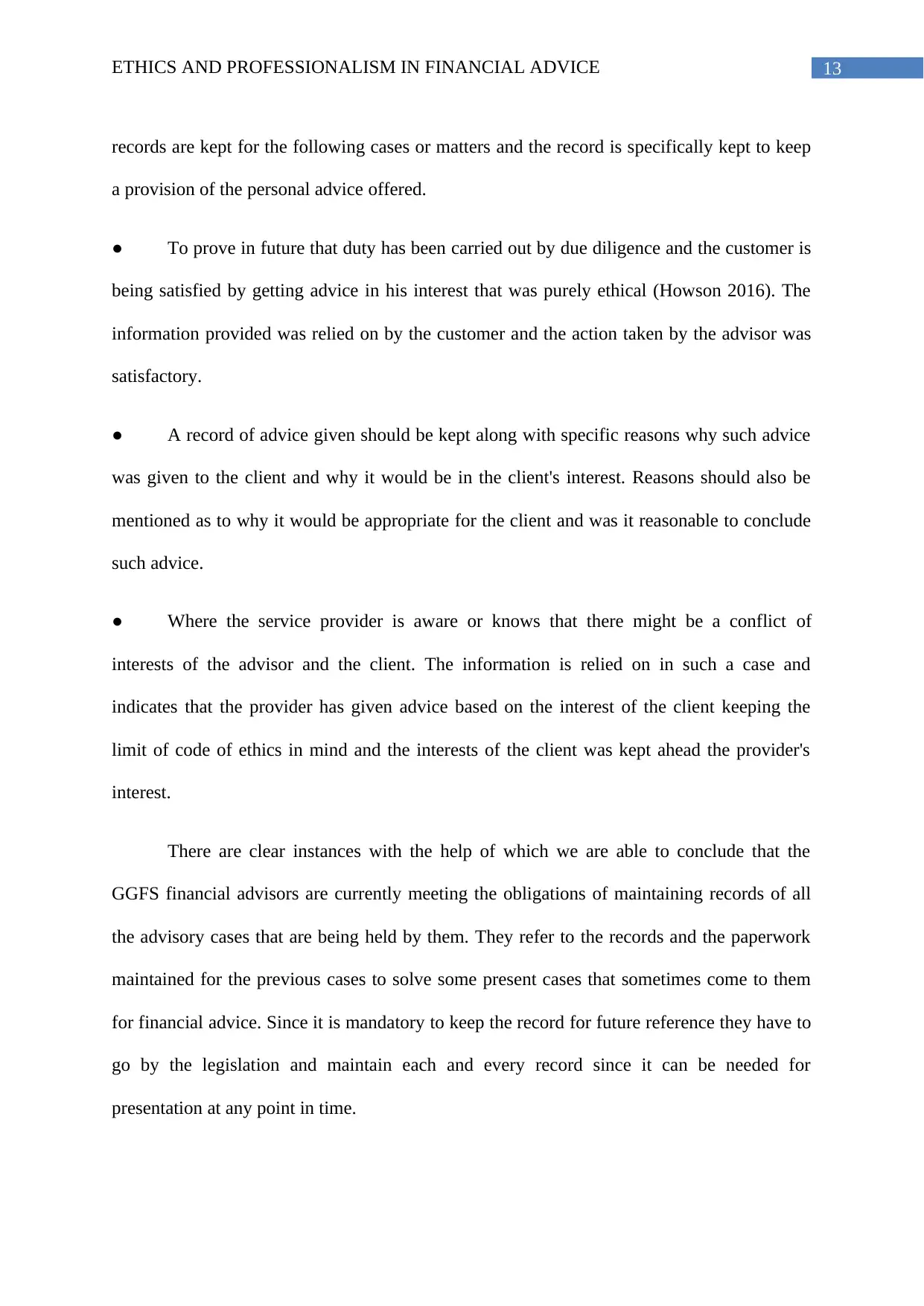
13ETHICS AND PROFESSIONALISM IN FINANCIAL ADVICE
records are kept for the following cases or matters and the record is specifically kept to keep
a provision of the personal advice offered.
● To prove in future that duty has been carried out by due diligence and the customer is
being satisfied by getting advice in his interest that was purely ethical (Howson 2016). The
information provided was relied on by the customer and the action taken by the advisor was
satisfactory.
● A record of advice given should be kept along with specific reasons why such advice
was given to the client and why it would be in the client's interest. Reasons should also be
mentioned as to why it would be appropriate for the client and was it reasonable to conclude
such advice.
● Where the service provider is aware or knows that there might be a conflict of
interests of the advisor and the client. The information is relied on in such a case and
indicates that the provider has given advice based on the interest of the client keeping the
limit of code of ethics in mind and the interests of the client was kept ahead the provider's
interest.
There are clear instances with the help of which we are able to conclude that the
GGFS financial advisors are currently meeting the obligations of maintaining records of all
the advisory cases that are being held by them. They refer to the records and the paperwork
maintained for the previous cases to solve some present cases that sometimes come to them
for financial advice. Since it is mandatory to keep the record for future reference they have to
go by the legislation and maintain each and every record since it can be needed for
presentation at any point in time.
records are kept for the following cases or matters and the record is specifically kept to keep
a provision of the personal advice offered.
● To prove in future that duty has been carried out by due diligence and the customer is
being satisfied by getting advice in his interest that was purely ethical (Howson 2016). The
information provided was relied on by the customer and the action taken by the advisor was
satisfactory.
● A record of advice given should be kept along with specific reasons why such advice
was given to the client and why it would be in the client's interest. Reasons should also be
mentioned as to why it would be appropriate for the client and was it reasonable to conclude
such advice.
● Where the service provider is aware or knows that there might be a conflict of
interests of the advisor and the client. The information is relied on in such a case and
indicates that the provider has given advice based on the interest of the client keeping the
limit of code of ethics in mind and the interests of the client was kept ahead the provider's
interest.
There are clear instances with the help of which we are able to conclude that the
GGFS financial advisors are currently meeting the obligations of maintaining records of all
the advisory cases that are being held by them. They refer to the records and the paperwork
maintained for the previous cases to solve some present cases that sometimes come to them
for financial advice. Since it is mandatory to keep the record for future reference they have to
go by the legislation and maintain each and every record since it can be needed for
presentation at any point in time.
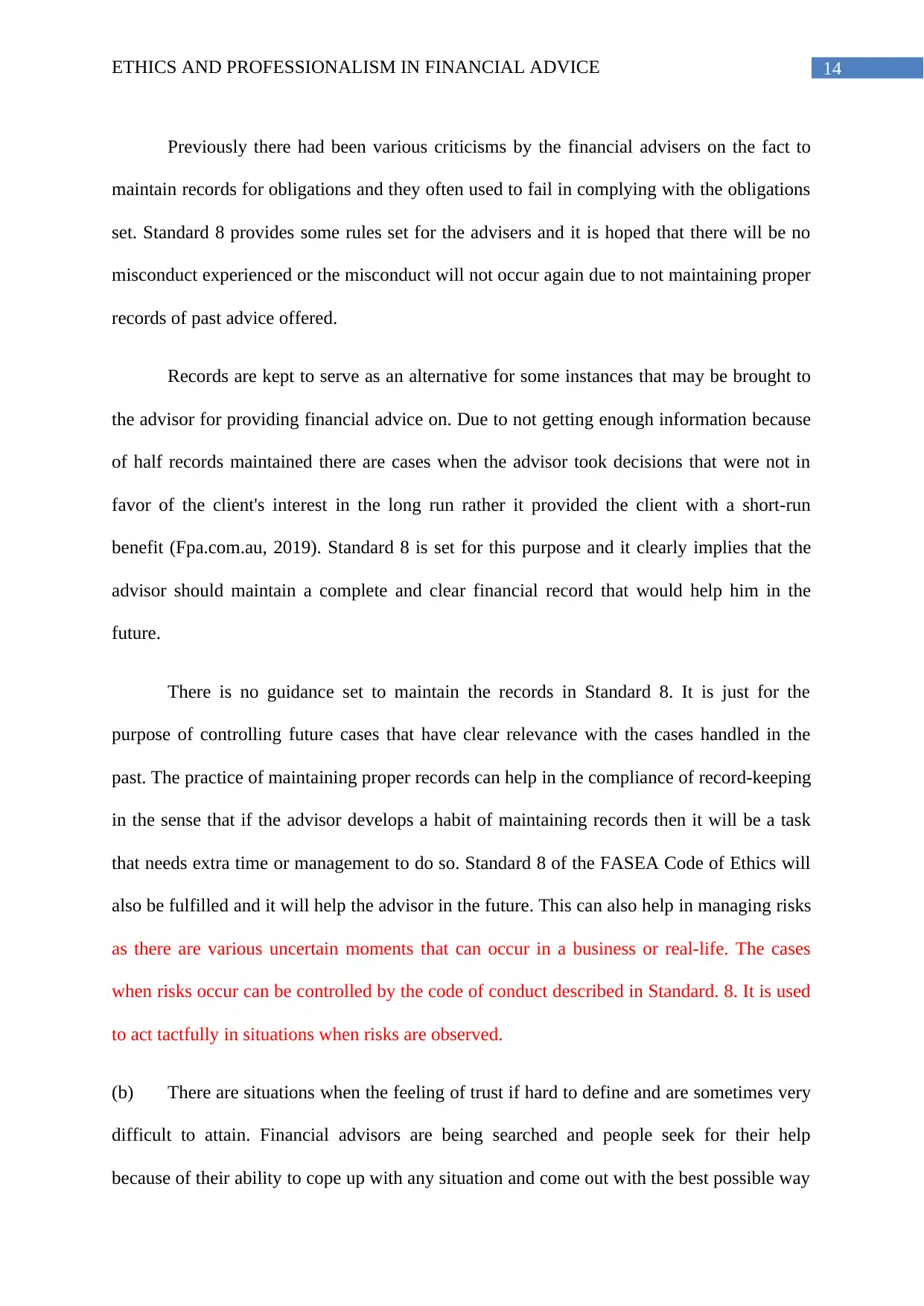
14ETHICS AND PROFESSIONALISM IN FINANCIAL ADVICE
Previously there had been various criticisms by the financial advisers on the fact to
maintain records for obligations and they often used to fail in complying with the obligations
set. Standard 8 provides some rules set for the advisers and it is hoped that there will be no
misconduct experienced or the misconduct will not occur again due to not maintaining proper
records of past advice offered.
Records are kept to serve as an alternative for some instances that may be brought to
the advisor for providing financial advice on. Due to not getting enough information because
of half records maintained there are cases when the advisor took decisions that were not in
favor of the client's interest in the long run rather it provided the client with a short-run
benefit (Fpa.com.au, 2019). Standard 8 is set for this purpose and it clearly implies that the
advisor should maintain a complete and clear financial record that would help him in the
future.
There is no guidance set to maintain the records in Standard 8. It is just for the
purpose of controlling future cases that have clear relevance with the cases handled in the
past. The practice of maintaining proper records can help in the compliance of record-keeping
in the sense that if the advisor develops a habit of maintaining records then it will be a task
that needs extra time or management to do so. Standard 8 of the FASEA Code of Ethics will
also be fulfilled and it will help the advisor in the future. This can also help in managing risks
as there are various uncertain moments that can occur in a business or real-life. The cases
when risks occur can be controlled by the code of conduct described in Standard. 8. It is used
to act tactfully in situations when risks are observed.
(b) There are situations when the feeling of trust if hard to define and are sometimes very
difficult to attain. Financial advisors are being searched and people seek for their help
because of their ability to cope up with any situation and come out with the best possible way
Previously there had been various criticisms by the financial advisers on the fact to
maintain records for obligations and they often used to fail in complying with the obligations
set. Standard 8 provides some rules set for the advisers and it is hoped that there will be no
misconduct experienced or the misconduct will not occur again due to not maintaining proper
records of past advice offered.
Records are kept to serve as an alternative for some instances that may be brought to
the advisor for providing financial advice on. Due to not getting enough information because
of half records maintained there are cases when the advisor took decisions that were not in
favor of the client's interest in the long run rather it provided the client with a short-run
benefit (Fpa.com.au, 2019). Standard 8 is set for this purpose and it clearly implies that the
advisor should maintain a complete and clear financial record that would help him in the
future.
There is no guidance set to maintain the records in Standard 8. It is just for the
purpose of controlling future cases that have clear relevance with the cases handled in the
past. The practice of maintaining proper records can help in the compliance of record-keeping
in the sense that if the advisor develops a habit of maintaining records then it will be a task
that needs extra time or management to do so. Standard 8 of the FASEA Code of Ethics will
also be fulfilled and it will help the advisor in the future. This can also help in managing risks
as there are various uncertain moments that can occur in a business or real-life. The cases
when risks occur can be controlled by the code of conduct described in Standard. 8. It is used
to act tactfully in situations when risks are observed.
(b) There are situations when the feeling of trust if hard to define and are sometimes very
difficult to attain. Financial advisors are being searched and people seek for their help
because of their ability to cope up with any situation and come out with the best possible way
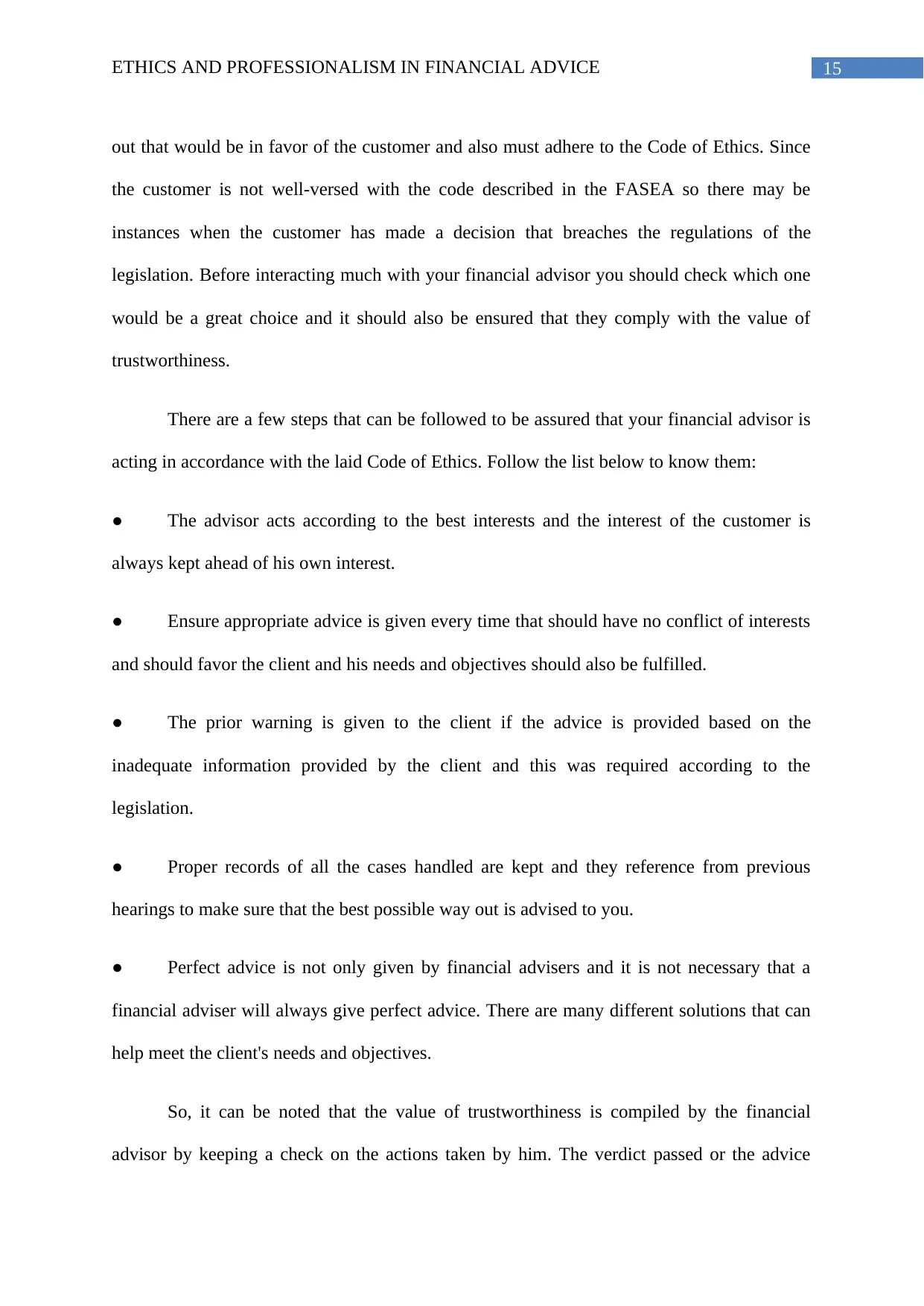
15ETHICS AND PROFESSIONALISM IN FINANCIAL ADVICE
out that would be in favor of the customer and also must adhere to the Code of Ethics. Since
the customer is not well-versed with the code described in the FASEA so there may be
instances when the customer has made a decision that breaches the regulations of the
legislation. Before interacting much with your financial advisor you should check which one
would be a great choice and it should also be ensured that they comply with the value of
trustworthiness.
There are a few steps that can be followed to be assured that your financial advisor is
acting in accordance with the laid Code of Ethics. Follow the list below to know them:
● The advisor acts according to the best interests and the interest of the customer is
always kept ahead of his own interest.
● Ensure appropriate advice is given every time that should have no conflict of interests
and should favor the client and his needs and objectives should also be fulfilled.
● The prior warning is given to the client if the advice is provided based on the
inadequate information provided by the client and this was required according to the
legislation.
● Proper records of all the cases handled are kept and they reference from previous
hearings to make sure that the best possible way out is advised to you.
● Perfect advice is not only given by financial advisers and it is not necessary that a
financial adviser will always give perfect advice. There are many different solutions that can
help meet the client's needs and objectives.
So, it can be noted that the value of trustworthiness is compiled by the financial
advisor by keeping a check on the actions taken by him. The verdict passed or the advice
out that would be in favor of the customer and also must adhere to the Code of Ethics. Since
the customer is not well-versed with the code described in the FASEA so there may be
instances when the customer has made a decision that breaches the regulations of the
legislation. Before interacting much with your financial advisor you should check which one
would be a great choice and it should also be ensured that they comply with the value of
trustworthiness.
There are a few steps that can be followed to be assured that your financial advisor is
acting in accordance with the laid Code of Ethics. Follow the list below to know them:
● The advisor acts according to the best interests and the interest of the customer is
always kept ahead of his own interest.
● Ensure appropriate advice is given every time that should have no conflict of interests
and should favor the client and his needs and objectives should also be fulfilled.
● The prior warning is given to the client if the advice is provided based on the
inadequate information provided by the client and this was required according to the
legislation.
● Proper records of all the cases handled are kept and they reference from previous
hearings to make sure that the best possible way out is advised to you.
● Perfect advice is not only given by financial advisers and it is not necessary that a
financial adviser will always give perfect advice. There are many different solutions that can
help meet the client's needs and objectives.
So, it can be noted that the value of trustworthiness is compiled by the financial
advisor by keeping a check on the actions taken by him. The verdict passed or the advice
Secure Best Marks with AI Grader
Need help grading? Try our AI Grader for instant feedback on your assignments.

16ETHICS AND PROFESSIONALISM IN FINANCIAL ADVICE
given should not only be based on the interests of the financial advisor rather he should
always try to give advice that is in the customer's interest. His objectives must be
accomplished and it should also be ensured that there is no self-interest of the advisor present.
Code of Ethics laid is always followed and there should be no breach even if a client
demands to make a decision that is against the laid rules.
given should not only be based on the interests of the financial advisor rather he should
always try to give advice that is in the customer's interest. His objectives must be
accomplished and it should also be ensured that there is no self-interest of the advisor present.
Code of Ethics laid is always followed and there should be no breach even if a client
demands to make a decision that is against the laid rules.
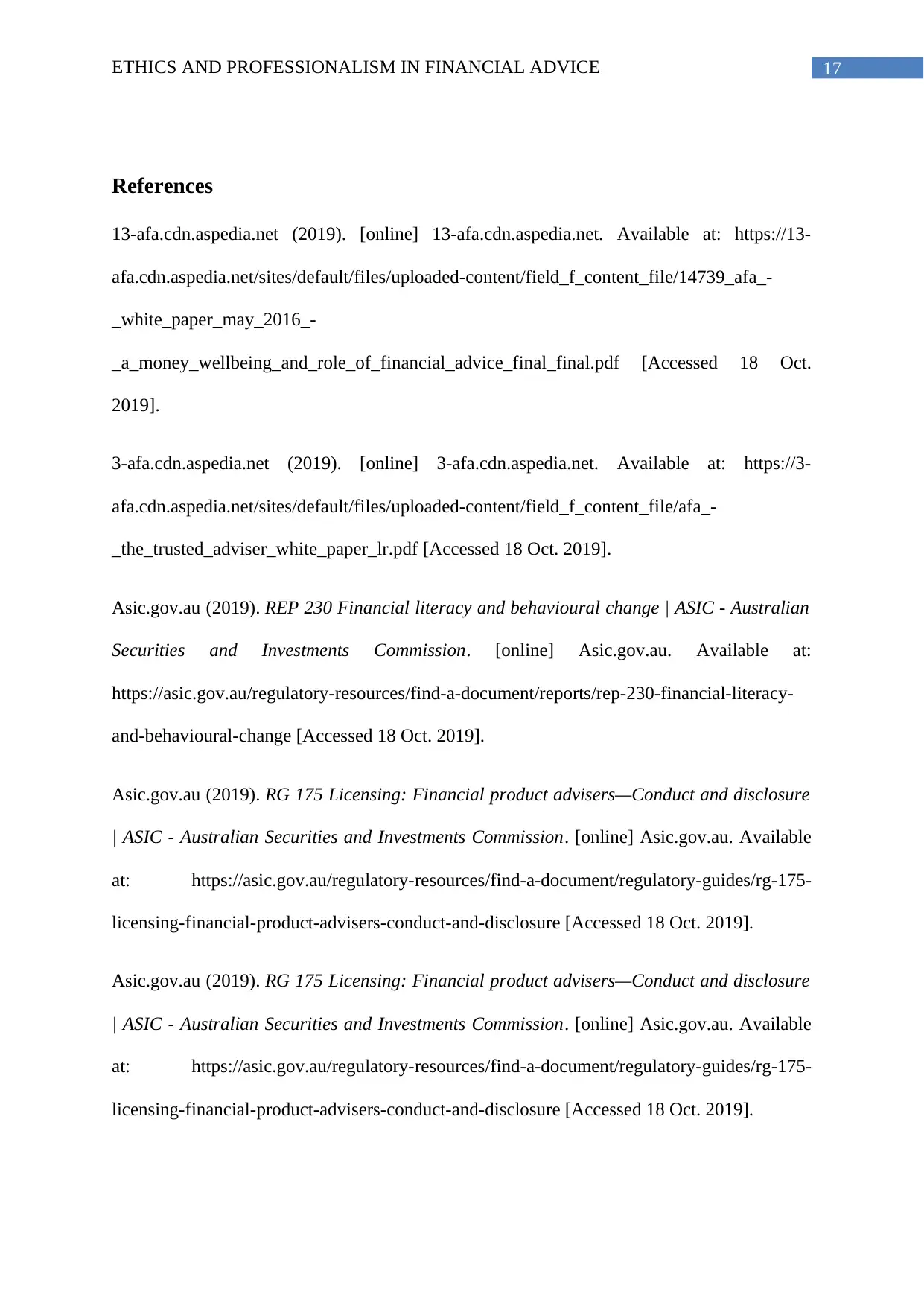
17ETHICS AND PROFESSIONALISM IN FINANCIAL ADVICE
References
13-afa.cdn.aspedia.net (2019). [online] 13-afa.cdn.aspedia.net. Available at: https://13-
afa.cdn.aspedia.net/sites/default/files/uploaded-content/field_f_content_file/14739_afa_-
_white_paper_may_2016_-
_a_money_wellbeing_and_role_of_financial_advice_final_final.pdf [Accessed 18 Oct.
2019].
3-afa.cdn.aspedia.net (2019). [online] 3-afa.cdn.aspedia.net. Available at: https://3-
afa.cdn.aspedia.net/sites/default/files/uploaded-content/field_f_content_file/afa_-
_the_trusted_adviser_white_paper_lr.pdf [Accessed 18 Oct. 2019].
Asic.gov.au (2019). REP 230 Financial literacy and behavioural change | ASIC - Australian
Securities and Investments Commission. [online] Asic.gov.au. Available at:
https://asic.gov.au/regulatory-resources/find-a-document/reports/rep-230-financial-literacy-
and-behavioural-change [Accessed 18 Oct. 2019].
Asic.gov.au (2019). RG 175 Licensing: Financial product advisers—Conduct and disclosure
| ASIC - Australian Securities and Investments Commission. [online] Asic.gov.au. Available
at: https://asic.gov.au/regulatory-resources/find-a-document/regulatory-guides/rg-175-
licensing-financial-product-advisers-conduct-and-disclosure [Accessed 18 Oct. 2019].
Asic.gov.au (2019). RG 175 Licensing: Financial product advisers—Conduct and disclosure
| ASIC - Australian Securities and Investments Commission. [online] Asic.gov.au. Available
at: https://asic.gov.au/regulatory-resources/find-a-document/regulatory-guides/rg-175-
licensing-financial-product-advisers-conduct-and-disclosure [Accessed 18 Oct. 2019].
References
13-afa.cdn.aspedia.net (2019). [online] 13-afa.cdn.aspedia.net. Available at: https://13-
afa.cdn.aspedia.net/sites/default/files/uploaded-content/field_f_content_file/14739_afa_-
_white_paper_may_2016_-
_a_money_wellbeing_and_role_of_financial_advice_final_final.pdf [Accessed 18 Oct.
2019].
3-afa.cdn.aspedia.net (2019). [online] 3-afa.cdn.aspedia.net. Available at: https://3-
afa.cdn.aspedia.net/sites/default/files/uploaded-content/field_f_content_file/afa_-
_the_trusted_adviser_white_paper_lr.pdf [Accessed 18 Oct. 2019].
Asic.gov.au (2019). REP 230 Financial literacy and behavioural change | ASIC - Australian
Securities and Investments Commission. [online] Asic.gov.au. Available at:
https://asic.gov.au/regulatory-resources/find-a-document/reports/rep-230-financial-literacy-
and-behavioural-change [Accessed 18 Oct. 2019].
Asic.gov.au (2019). RG 175 Licensing: Financial product advisers—Conduct and disclosure
| ASIC - Australian Securities and Investments Commission. [online] Asic.gov.au. Available
at: https://asic.gov.au/regulatory-resources/find-a-document/regulatory-guides/rg-175-
licensing-financial-product-advisers-conduct-and-disclosure [Accessed 18 Oct. 2019].
Asic.gov.au (2019). RG 175 Licensing: Financial product advisers—Conduct and disclosure
| ASIC - Australian Securities and Investments Commission. [online] Asic.gov.au. Available
at: https://asic.gov.au/regulatory-resources/find-a-document/regulatory-guides/rg-175-
licensing-financial-product-advisers-conduct-and-disclosure [Accessed 18 Oct. 2019].
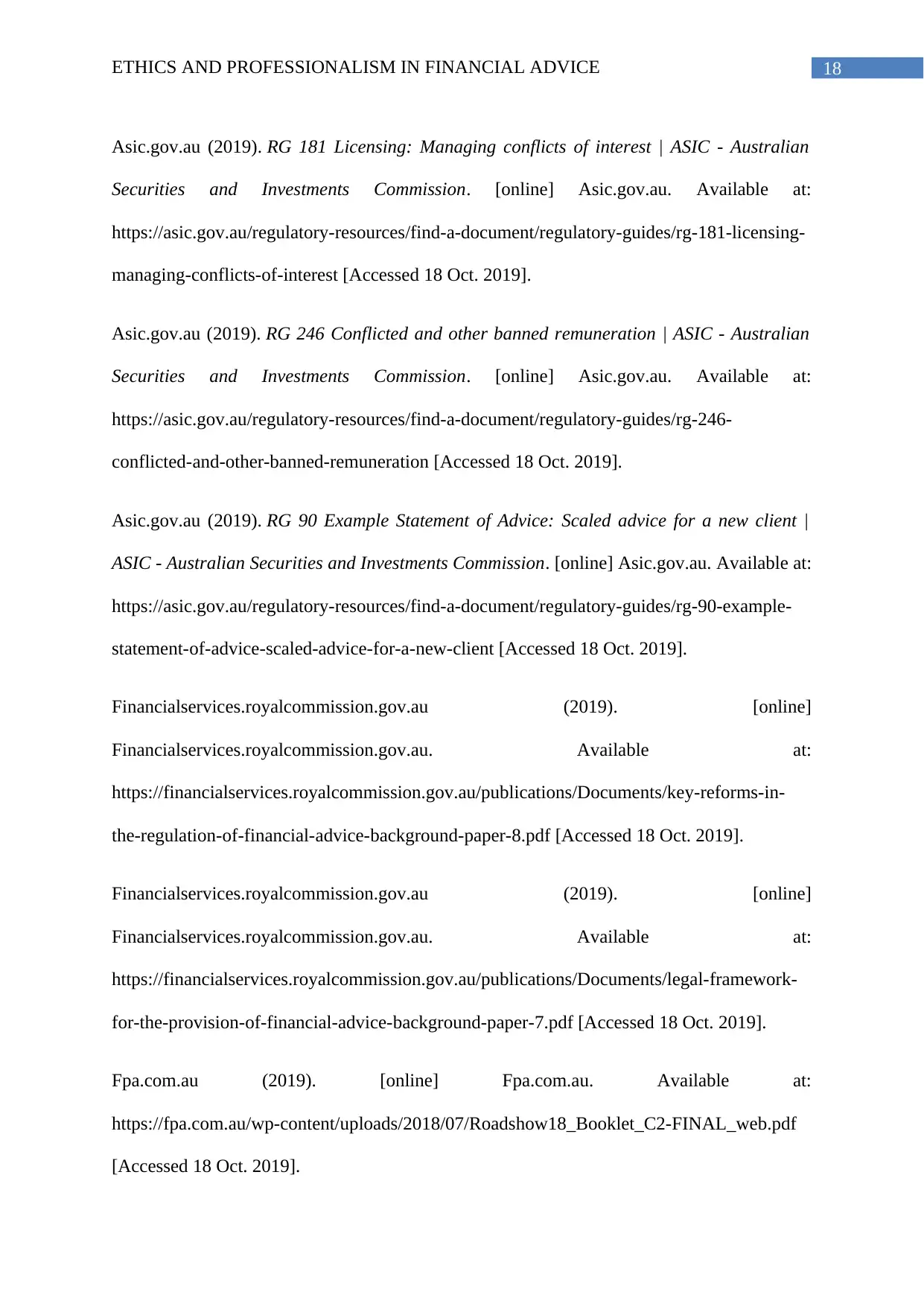
18ETHICS AND PROFESSIONALISM IN FINANCIAL ADVICE
Asic.gov.au (2019). RG 181 Licensing: Managing conflicts of interest | ASIC - Australian
Securities and Investments Commission. [online] Asic.gov.au. Available at:
https://asic.gov.au/regulatory-resources/find-a-document/regulatory-guides/rg-181-licensing-
managing-conflicts-of-interest [Accessed 18 Oct. 2019].
Asic.gov.au (2019). RG 246 Conflicted and other banned remuneration | ASIC - Australian
Securities and Investments Commission. [online] Asic.gov.au. Available at:
https://asic.gov.au/regulatory-resources/find-a-document/regulatory-guides/rg-246-
conflicted-and-other-banned-remuneration [Accessed 18 Oct. 2019].
Asic.gov.au (2019). RG 90 Example Statement of Advice: Scaled advice for a new client |
ASIC - Australian Securities and Investments Commission. [online] Asic.gov.au. Available at:
https://asic.gov.au/regulatory-resources/find-a-document/regulatory-guides/rg-90-example-
statement-of-advice-scaled-advice-for-a-new-client [Accessed 18 Oct. 2019].
Financialservices.royalcommission.gov.au (2019). [online]
Financialservices.royalcommission.gov.au. Available at:
https://financialservices.royalcommission.gov.au/publications/Documents/key-reforms-in-
the-regulation-of-financial-advice-background-paper-8.pdf [Accessed 18 Oct. 2019].
Financialservices.royalcommission.gov.au (2019). [online]
Financialservices.royalcommission.gov.au. Available at:
https://financialservices.royalcommission.gov.au/publications/Documents/legal-framework-
for-the-provision-of-financial-advice-background-paper-7.pdf [Accessed 18 Oct. 2019].
Fpa.com.au (2019). [online] Fpa.com.au. Available at:
https://fpa.com.au/wp-content/uploads/2018/07/Roadshow18_Booklet_C2-FINAL_web.pdf
[Accessed 18 Oct. 2019].
Asic.gov.au (2019). RG 181 Licensing: Managing conflicts of interest | ASIC - Australian
Securities and Investments Commission. [online] Asic.gov.au. Available at:
https://asic.gov.au/regulatory-resources/find-a-document/regulatory-guides/rg-181-licensing-
managing-conflicts-of-interest [Accessed 18 Oct. 2019].
Asic.gov.au (2019). RG 246 Conflicted and other banned remuneration | ASIC - Australian
Securities and Investments Commission. [online] Asic.gov.au. Available at:
https://asic.gov.au/regulatory-resources/find-a-document/regulatory-guides/rg-246-
conflicted-and-other-banned-remuneration [Accessed 18 Oct. 2019].
Asic.gov.au (2019). RG 90 Example Statement of Advice: Scaled advice for a new client |
ASIC - Australian Securities and Investments Commission. [online] Asic.gov.au. Available at:
https://asic.gov.au/regulatory-resources/find-a-document/regulatory-guides/rg-90-example-
statement-of-advice-scaled-advice-for-a-new-client [Accessed 18 Oct. 2019].
Financialservices.royalcommission.gov.au (2019). [online]
Financialservices.royalcommission.gov.au. Available at:
https://financialservices.royalcommission.gov.au/publications/Documents/key-reforms-in-
the-regulation-of-financial-advice-background-paper-8.pdf [Accessed 18 Oct. 2019].
Financialservices.royalcommission.gov.au (2019). [online]
Financialservices.royalcommission.gov.au. Available at:
https://financialservices.royalcommission.gov.au/publications/Documents/legal-framework-
for-the-provision-of-financial-advice-background-paper-7.pdf [Accessed 18 Oct. 2019].
Fpa.com.au (2019). [online] Fpa.com.au. Available at:
https://fpa.com.au/wp-content/uploads/2018/07/Roadshow18_Booklet_C2-FINAL_web.pdf
[Accessed 18 Oct. 2019].
Paraphrase This Document
Need a fresh take? Get an instant paraphrase of this document with our AI Paraphraser
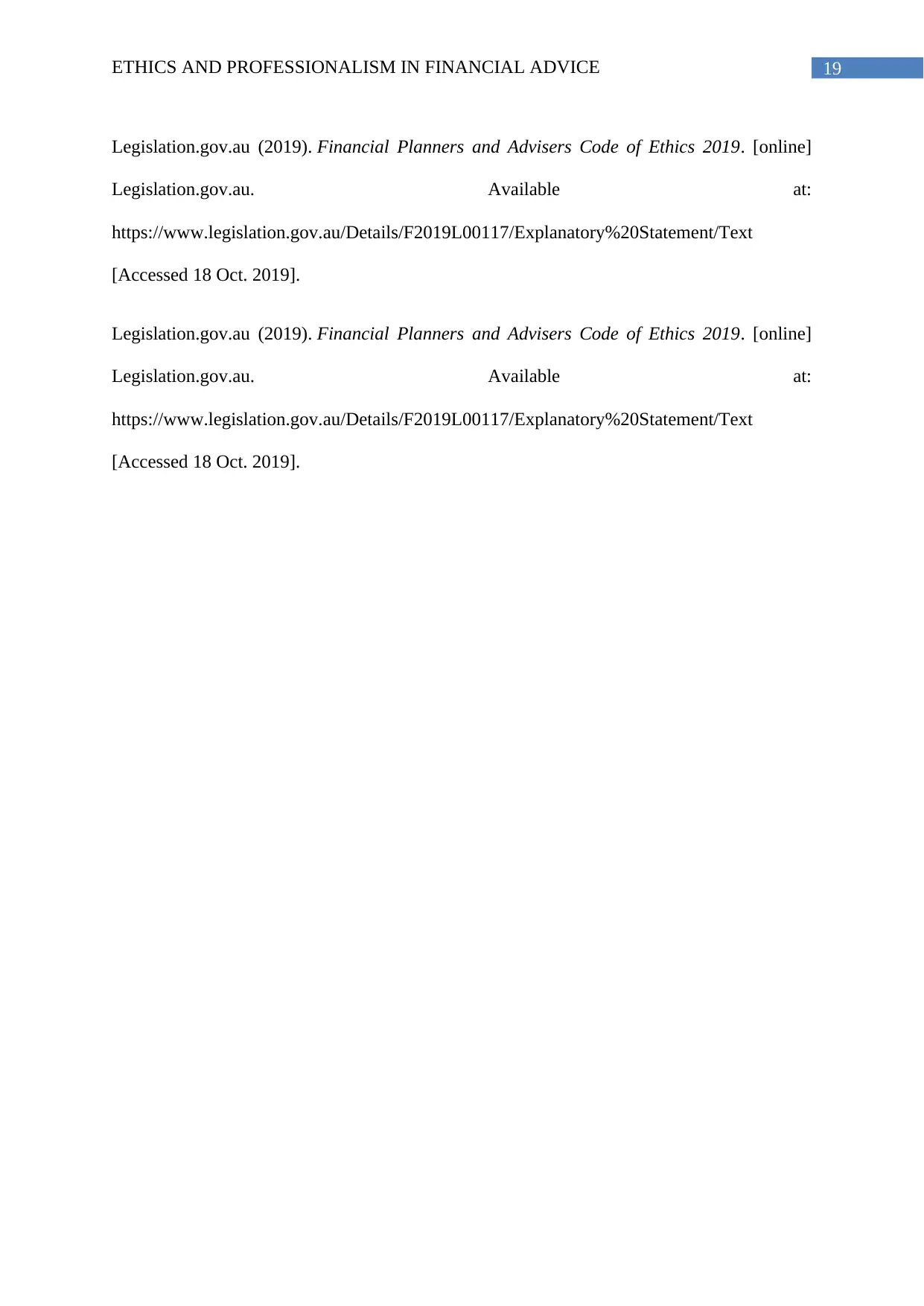
19ETHICS AND PROFESSIONALISM IN FINANCIAL ADVICE
Legislation.gov.au (2019). Financial Planners and Advisers Code of Ethics 2019. [online]
Legislation.gov.au. Available at:
https://www.legislation.gov.au/Details/F2019L00117/Explanatory%20Statement/Text
[Accessed 18 Oct. 2019].
Legislation.gov.au (2019). Financial Planners and Advisers Code of Ethics 2019. [online]
Legislation.gov.au. Available at:
https://www.legislation.gov.au/Details/F2019L00117/Explanatory%20Statement/Text
[Accessed 18 Oct. 2019].
Legislation.gov.au (2019). Financial Planners and Advisers Code of Ethics 2019. [online]
Legislation.gov.au. Available at:
https://www.legislation.gov.au/Details/F2019L00117/Explanatory%20Statement/Text
[Accessed 18 Oct. 2019].
Legislation.gov.au (2019). Financial Planners and Advisers Code of Ethics 2019. [online]
Legislation.gov.au. Available at:
https://www.legislation.gov.au/Details/F2019L00117/Explanatory%20Statement/Text
[Accessed 18 Oct. 2019].
1 out of 20
Related Documents
Your All-in-One AI-Powered Toolkit for Academic Success.
+13062052269
info@desklib.com
Available 24*7 on WhatsApp / Email
![[object Object]](/_next/static/media/star-bottom.7253800d.svg)
Unlock your academic potential
© 2024 | Zucol Services PVT LTD | All rights reserved.





